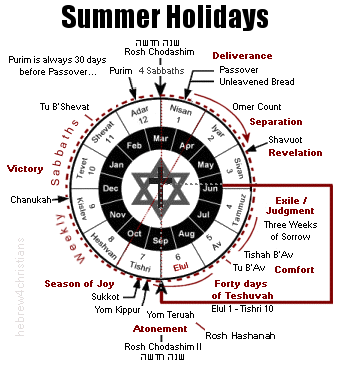|
Jewish Holiday Calendar
Note: For June 2015 site updates, please scroll past this entry....
In the summer there occurs a three week period of mourning that begins with the Fast of Tammuz and ends with Tishah B'Av. The last nine days of this three week period (i.e., from Av 1 until Av 9th) are days of increased mourning. However, after this somber time, the romantic holiday of Tu B'Av, the 15th of Av occurs. Summer ends with the 30 days of the month of Elul, a yearly season of teshuvah (repentance) that anticipates Rosh Hashanah and the fall holidays. The 30 days of Elul are combined with the first 10 days of the month of Tishri to create the "Forty Days of Teshuvah" that culminate with Yom Kippur.
Because they occur between the spring and fall holidays, the summer holidays help us prepare for the second coming of the Messiah:
The Summer Holidays:

Note that in accordance with tradition, holiday dates begin at sundown. Moreover, some holidays may be postponed one day if they happen to fall on the weekly Sabbath:
- Month of Tammuz (begins Tuesday, June 16th, 2015)
- Month of Av (begins Thursday, July 16th, 2015)
- Month of Elul (begins Friday August 14th, 2015)
Note: Many Jewish calendars will list the first day of a holiday without indicating that the holiday actually begins sundown the night before... So, for example, while Tishah B'Av begins Saturday, July 25th at sundown, many calendars will indicate it occurs on Sunday, July 26th...
June 2015 Updates
Lord of the Center...
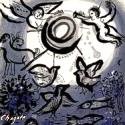
06.30.15 (Tammuz 13, 5775) God's Name is "I-AM-with-you-always," Immanuel (עִמָּנוּ אֵל) - always in the midst of you, your heart, your Center... The LORD is named this way because he is never without his own, and we are who we are in relation to his presence in our lives. Yeshua is not simply the Lord of the past or the Lord of the future, but the Lord of this moment, this "here" and this "now." He is the same yesterday, today, and forever - the breath of life, our sustaining hope, the Shepherd of our souls... Whatever else may come of this day, this is the day that the LORD has made, and we can find peace in God's Presence.
זֶה־הַיּוֹם עָשָׂה יְהוָה
נָגִילָה וְנִשְׂמְחָה בוֹ
zeh · ha·yom · a·sah · Adonai
na·gi·lah · ve·nis·me·chah ·vo

"This is the day that the LORD has made;
let us rejoice and be glad in it."
(Psalm 118:24)

Faith and Collision...
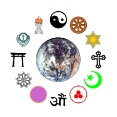
06.30.15 (Tammuz 13, 5775) The theology of Messiah insists that truth matters, and that knowing the truth about God is absolutely essential for life itself. Nothing is more important; nothing is more vital. As Yeshua solemnly affirmed: "This is eternal life (חַיֵּי עוֹלָם), that they may know you, the only true God (אֶל־אֱמֶת), and Yeshua the Messiah (יֵשׁוּעַ הַמָּשִׁיחַ) whom you have sent (John 17:3). Note that the Hebrew word for knowledge is da'at (דַּעַת), a word that implies intimate cognitive differentiation and the apprehension of spiritual reality. Your life is a venture of faith, an irrepeatable, infinitely costly venture. Faith both affirms and negates at the same time. Like falling in love with someone, the cost of passionately believing that Yeshua (alone) is the "way and the truth and the life" comes at the expense of other faith possibilities -- and thereby incurs the risk of offense (Rom. 9:33, 1 Pet. 2:7-8; Gal. 5:11, Matt. 24:8-11; etc.). Does this make faith in Messiah intolerant then? Not at all... All faith expressions - including skepticism, universalism, or "politically correct" humanism - are exclusivistic commitments to whatever the believer embraces as his or her "ground of ultimate concern." Each person has their own "narrow gate" -- though this gate does not necessarily lead to life. Yeshua taught that the "narrow gateway of life" (שַּׁעַר אֶל־הַחַיִּים) is found only by the few (Matt. 7:13-14), and this doubtlessly was said to reprove the mob mentality that regards "tolerance" as the greatest of all virtues and fanaticism as the greatest of all evils. There is safety in numbers, the mob reasons, and the life of genuine conviction makes you an outcast of the group, since it exposes the "groupthink" and its inevitable moral evasions.... Public enemy number one is the person of real conviction. This was true in the days of the Hebrew prophets as it is today. "The voice crying in the wilderness" often cries alone.
Our faith says humans are created b'tzelem Elohim - in the image of God. "In the beginning was the Logos" (John 1:1). Logic itself is "hard-wired" into us and any attempt to deny its validity presupposes its existence. Logic also presupposes any form of experience, since we cannot even identify something without its categories at work. Similarly, the sense of value is hard-wired into us. We cannot know anything without valuing (and willing) knowledge itself, and therefore our sense of value (and goodness) precedes all experience. So both empirical and moral truth is inescapable for self-conscious individuals. Now since faith is always faith in something, it is evident that it points to something "outside" of itself, namely, to reality. In matters of fact (rather than tautological statements such as a=a), the "belief that p" is an existential statement that "p exists." A particular belief can be mistaken, of course, but if it is a true belief then (by definition) it must proximally correspond to reality. In other words, our beliefs are confessions of faith concerning what is ultimately real.
Note: For more on this subject, see "Faith and Collision."
Shepherd in Darkness....
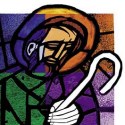
06.30.15 (Tammuz 13, 5775) "Yea, though I walk through the valley of the shadow of death, I will fear no evil..." (Psalm 23:4). O God of Light, Light of the world, surely You know my need for light as I look to You, especially when darkness tries to extinguish my hope. Despite my inability to see you now, help me to know that you are with me; let "thy rod and thy staff comfort me" and lead me closer to you. Lord, when I am afraid, quicken the faith you have put within my heart. Be Thou my Shepherd in my darkness, O Lord my God...
גַּם כִּי־אֵלֵךְ בְּגֵיא צַלְמָוֶת
לא־אִירָא רָע כִּי־אַתָּה עִמָּדִי
שִׁבְטְךָ וּמִשְׁעַנְתֶּךָ הֵמָּה יְנַחֲמֻנִי
gam · ki · e·lekh · be·gei · tzal·ma·vet
lo · i·ra · ra, · ki · at·tah · im·ma·di
shiv·te·kha · u·mish·an·te·kha · hem·mah · ye·na·cha·mu·ni

"Even though I walk through the valley of the shadow of death,
I will fear no evil, for You are with me;
Your rod and your staff, they comfort me"
(Psalm 23:4)

"Be not afraid." Over and over again in the Scriptures we hear the LORD saying to those who trust in Him, al-tirah, "be not afraid." Nachman of Breslov is reported to have once said, "All the earth is a very narrow bridge (כָּל־הָעוֹלָם כֻּלּוֹ גֶּשֶׁר צַר מְאד), and the point of life is never to be afraid." Likewise we trust Yeshua to be the Bridge to the Father, the narrow way of passage that leads to everlasting life. He calls out to us in the storms of this world, "Take heart. It is I; be not afraid" (Matt. 14:27). The heart of faith senses the LORD's presence, even in the darkness, and hears the Spirit saying, "I am with you..."
I do not see the road ahead of me, I cannot know for certain where it will end. Nor do I really know myself, and the fact that I think I am following your will does not mean I am actually doing so. But I believe the desire to please you does in fact please you, and I hope I have that desire in all that I am doing. I hope that I will never do anything apart from that desire. And I know that if I do this you will lead me by the right road, though I may know nothing about it. Therefore, I will trust you always, though I may seem to be lost and in the shadow of death. I will not fear, for your are ever with me, and you will never leave me to face my perils alone. - Thomas Merton
In times of testing, how desperately do we need a sense of companionship and intimacy with the Lord! When you feel abandoned, ashamed, or alone; or when you are afraid and unsure of yourself; or when pain distances you from others, nudging you to isolation or loneliness, then may God's Spirit brood over you, whispering your name, reminding you that you are never alone, and that God Himself is forever for you, despite yourself. Therefore "fear no evil," because God is with you in the midst of your present darkness. As it is written: "Surely goodness and love shall pursue you all the days of your life, and you shall dwell in the house of the LORD forever" (Psalm 23:6). Come alive, O heart of faith!
Note: You prayers for this ministry are deeply and sincerely appreciated, friends...
The Doctrine of Balaam...

[ The following entry concerns this week's Torah reading, parashat Balak... ]
06.29.15 (Tammuz 12, 5775) The "doctrine of Balaam" (ἡ διδαχή Βαλαάμ) is the wicked strategy of enticing others to sin by encouraging them to "eat food offered to idols" and to engage in sexual immorality (Rev. 2:14). This was how Balaam was able finally to curse the Israelites at Baal Peor, after all (see Num. 25:1-10; 31:16). In short, Balaam's doctrine was one of "syncretism," advocating a mindless "tolerance" that arrogantly claimed that all religions are equally true, and therefore all are equally false... Such "tolerance" is a charade for moral and spiritual nihilism that lends itself well to political fascism. In ancient Rome, official "tolerance" led to the brutal intolerance of the "Imperial Cult" where the power of the State (represented by the Emperor) was worshiped. In our age, the doctrine of Balaam first entices people to "eat food offered to idols," that is, to partake of the irrational dogma of "absolute tolerance" and unthinking universalism. After opening the heart to accept such idolatry, sexual immorality is the natural expression, a consequence of debasing doctrinal promiscuity. God sets us free from the slavery of surrounding culture to become a witness of the truth. Assimilating with this world and its political ideals is spiritual adultery. Do not fool yourself: Whoever makes himself a friend of the world is an enemy of God (James 4:4).
כִּיּ בְּרב חָכְמָה רָב־כָּעַס
וְיוֹסִיף דַּעַת יוֹסִיף מַכְאוֹב
ki · be'rov · choch·mah · rov-ka·as
ve·yo·sif · da'at · yo·sif · makh·ov

"For in much wisdom is much vexation,
and he who increases knowledge increases sorrow"
(Eccl. 1:18)

Resisting the Darkness...

06.29.15 (Tammuz 12, 5775) The Spirit states that in acharit ha'yamim (אַחֲרִית הַיָּמִים), the latter days, people will have "seared consciences," that is, a moral sense that is rendered unresponsive, numb, and unfeeling... People will be unable to discern the significance of moral and spiritual reality, thereby silencing any qualm of moral protest. We see this today in our scandal-saturated culture, as politicians brazenly lie with impunity and moral anarchy is openly celebrated. We must be careful not to heed the devil's logic of compromise, that "dialectic" that denies transcendental moral reality by pretending that truth can only be defined by the exigencies of the hour and its desire. "The world passes away and the lusts thereof..." (1 John 2:17). We must consciously remind ourselves that the LORD God of Israel does not endorse sin, regardless of any supposed political benefit given to the world at large, and that the end never justifies the means. God is not a pragmatist, and there are no "noble lies" for sake of the Kingdom of Heaven...
Martin Buber once said, "What is accomplished through lies can assume the mask of truth; what is accomplished through violence can go in the guise of justice, and for a while the hoax may be successful. But soon people realize that lies are lies at bottom, that violence is violence - and that both lies and violence will suffer the destiny history has in store for all that is false." As Yeshua himself said, "For this purpose I was born and for this purpose I have come into the world -- to bear witness to the truth. Everyone who is of the truth listens to my voice" (John 18:37). "Blessed are those who wash their robes, so that they may have the right to the Tree of Life and that they may enter the city by the gates. Outside are all those who love and practice the lie..." (Rev. 22:14-15).
Does the End Justify the Means?
In the realm of ethics, a basic problem with "means-to-end reasoning" is defining what is meant by "the good." It simply begs the question to say that what is "right" is that which brings about the desired outcome, since we must still explain why one outcome is more "desirable" than another. Political zealots have always defended their barbarity by claiming that it was for the sake of "a better world" or for a "greater good." Indeed the Antichrist will be a big believer that the "ends justify the means" as he employs global deception and global enslavement for the sake of his perverted vision of utopia.
The Scriptures reveal that we do not "discover" what is right by means of experience, but we bring to experience an intuitive sense of moral value and truth (Rom. 2:15). The Apostle Paul condemned the pragmatic thought, "let us do evil that good may come" (Rom. 3:8), which means he rejected the supposition that we can disregard the moral quality of our methods for the sake of a good end. Tragically people may think they are doing "many wonderful works" in God's name, and their goals may indeed be good, but the Lord will say to them, "Depart from me, you who practice lawlessness," because they are not doing according the will of the Father (Matt. 7:22-23). Even when the end is good, we must still walk out everything else God specified. We don't lie or sugarcoat the demands of the gospel, even if by employing such methods we were seemingly able to "convert" the entire world.
Perfected Strength...

06.29.15 (Tammuz 12, 5775) "Have you not known? Have you not heard? The Eternal One, the LORD, is the Creator of the ends of the earth (בּוֹרֵא קְצוֹת הָאָרֶץ). He does not faint nor grow weary; his understanding is unsearchable. He gives power to the faint, and to him who has no might he increases strength" (Isa. 40:28-29). Human reason has no objection that God can impart strength, but it objects that strength is found in those who are broken and weary, that is, to the "poor in spirit" who mourn over their lives... And yet it is so: God gives strength to the weary, to the faint, to those who are at the end of themselves: "My power is made perfect (τελειοῦται) in weakness" (2 Cor. 12:9). Man's way is to seek charisma, to esteem those who have natural beauty, charm, or special talents, whereas God's way is first to break us, to make us weaker and weaker, so that he can then fill us with the miraculous divine nature (2 Cor. 4:7). Like all sacrifices that were brought to the altar, we must pass through death to life by means of our union with the Messiah at the cross... It is only after the cross that it may be said, "It is no longer 'I' who lives; now it is Messiah who lives His life in me." There is indeed strength, power, and victory – but such comes after we reckon carnal energy as useless. Indeed, the word "Hebrew" (עִבְרִי) means one who has "crossed over" (עָבַר) to the other side, as our father Abraham did (Gen. 14:13). It is on the other side of the cross that we experience the very power that created the universe "out of nothing" (i.e., yesh me'ayin: יֵשׁ מֵאַיִן) and that raised Yeshua the Messiah from the dead. "Not by might, nor by power, but by My Spirit, says Adonai Tzeva'ot."
נתֵן לַיָּעֵף כּחַ
וּלְאֵין אוֹנִים עָצְמָה יַרְבֶּה
no·tein · la·ya·ef · ko·ach
u·le·ein · o·nim · otz·mah · yar·beh

"He gives power to the faint,
and to him who has no might he increases strength"
(Isa. 40:29)
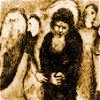
Download Study Card
Note that the word translated "strength" in this verse (otzmah) comes from the same root for "bones" (עֲצָמוֹת). This alludes to the vision of the "dry bones" being clothed with life at the time of resurrection. "Thus says the Lord God to these bones: 'Behold, I will cause breath to enter you, and you shall live'" (Ezek. 37:5). If God has the power to give life to dessicated bones, surely his resurrection power can "quicken us" through the life of our beloved Savior Yeshua who said, "You will receive power (i.e., koach: כּחַ) when the Holy Spirit has come upon you, and you will be my witnesses" (Acts 1:7). Indeed you can do "all things" through Messiah who strengthens you (Phil. 4:13).
Overruling the Wicked...

06.28.15 (Tammuz 11, 5775) Our Torah portion for this week (Balak) is named after a fearful Moabite king (בָּלָק) who sought to curse the Jewish people by hiring the services of a wicked Midianite "prophet" named Balaam (בִּלְעָם). King Balak's plan was to employ Balaam's sorcery (כַּשָׁפוּת) against the Israelites to prevent them from entering the Promised Land. Similar to the delicious irony that befell the villain Haman in the Book of Esther, however, King Balak's scheme was upended, and the curse he sought to put on the Jewish people was repeatedly pronounced as a blessing by Balaam instead. After several foiled attempts, Balak fretfully dismissed the prophet, but before departing from the dejected king, Balaam ironically prophesied the destruction of the Moabites and the victorious establishment of Israel. The shameful story of Balaam reveals that "there is no enchantment against Jacob, no divination against Israel" (Num. 23:23). Ein od milvado (אֵין עוֹד מִלְבַדּו) - no weapon or scheme devised against God will ever prosper (Isa. 54:15-17).
But who was this mysterious prophet named Balaam? According to Jewish tradition, Jacob's wicked uncle Laban had a son named Beor (בְּעוֹר), who became the father of Balaam. In other words, the "cursing prophet" Balaam was none other than the grandson of Laban:
 |
Note that the name "Beor" first appears in connection with a king of Edom (Gen. 36:32), which suggests that Balaam might have once been a king of the Edomites (i.e., the descendants of Esau). Further note the phonetic similarity to Peor. If Beor and Peor are the same, then Balaam was actually a prophet of Baal Peor, a local Semitic god.
Balaam was regarded as a great seer, magician and an adept in the occult. He had an "evil eye" and drew the spirit of demons to anything he gazed upon (Avot 5:22). His notoriety made him famous, and powerful people asked him to invoke curses on their enemies. The Talmud (Sanhedrin 106a) states that Balaam became so famous as a magician that he later became a chief advisor to Pharaoh. It was Balaam who advised the new Pharaoh to enslave the Israelites and to afflict them with brutal taskmasters (Exod. 1:8-11). For more information about the identity of Balaam, see the entry entitled, "The Curses of Balaam."
The Decree of Faith...

06.26.15 (Tammuz 9, 5775) "This is the decree of the Torah... take a red cow" (Num. 19:2). The mitzvah of the red cow is called "the" decree of Torah (חֻקַּת הַתּוֹרָה), as if it were the central mitzvah, thereby highlighting the necessity of faith, and in particular, faith that believes healing from death is obtained by a divine exchange of the pure for the impure. The idea of God's substitutionary atonement, his love that empathizes and heals you of sin - is therefore the heart of faith, the central decree of true Torah. And this, of course, is the message of the cross itself: Jesus "saves people from their sins" (Matt. 1:21). Yeshua was willing to become unclean, cut off, and the bearer of your sin so that you could be made pure, clean, and accepted in exchange (2 Cor. 5:21). May He "purge you with hyssop" so that you are made whiter than snow (Psalm 51:7).
Purging with Hyssop....

06.26.15 (Tammuz 9, 5775) It is noteworthy that cedarwood, hyssop, and scarlet thread were used not only for cleansing the leper (Lev. 14) and for cleansing from contact with death (Num. 19), but also during the ratification of the covenant at Sinai (Exod. 24:8; Heb. 9:19-20) and indeed during the crucifixion of our Lord. Of course hyssop (אֵזוֹב) is first mentioned regarding the application of the blood of the lamb upon the doorposts during the Passover (Exod. 12:22), and King David later appealed to God for cleansing saying, "purge me with hyssop, and I shall be clean" (Psalm 51:7). A hyssop branch was also used to offer vinegar to Messiah during the time of his crucifixion (John 19:29). Likewise the wood from a cedar tree (עֵץ אֶרֶז) was used to purify both the leper and those contaminated with death, and it is likely the type of wood used for the cross of Messiah. Finally, scarlet (שָׁנִי) thread symbolizes both blood and royalty, and appears in the birth of Judah's children Zerach and Peretz (Gen. 38:28), in the coverings of the Tabernacle, as a sign of Rahab's faith (Josh 2:8,21), and as the color of the robe of Messiah during his crucifixion (Matt. 27:28).
Saved from Death's Sting...
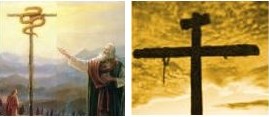
[ The following concerns this week's Torah reading, parashat Chukat... ]
06.26.15 (Tammuz 9, 5775) "Everyone who is bitten, when he sees it, shall live" (Num. 21:8). The fiery serpent – the very sting of which brings death – is what must be looked upon, confronted, and confessed. We must look at that which kills us, and by seeing it, we can then see God's miracle (נֵּס) that delivers us... Therefore we look to the cross – the place where Yeshua clothed himself with our sickness and sin – to realize God's remedy for our eternal healing. As Yeshua explained to Nicodemus, "As Moses lifted up the serpent in the wilderness, so must the Son of Man be lifted up, that whoever believes in him may have eternal life" (John 3:14-15). Humanity as a whole has been "bitten by the snake" and needs to be delivered from its lethal venom. Just as the image made in the likeness of the destroying snake was lifted up for Israel's healing, so the One made in the likeness of sinful flesh (Rom. 8:3) was to be lifted up as the Healer of the world. In Yeshua the miraculous exchange takes place: "For our sake he made him to be sin who knew no sin, so that in him we might become the righteousness of God" (2 Cor. 5:21). Bless His holy name!
The Sin of Moses...
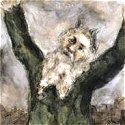
[ The following concerns this week's Torah reading, parashat Chukat... ]
06.26.15 (Tammuz 9, 5775) And God said, "Speak to the rock..." but Moses struck the rock twice with his staff" (Num. 20:8,11). This was apparently Moses' sin for which his punishment was exile from the Promised Land. The punishment might seem severe, but in light of God's Redemptive Plan given in Messiah, Moses' actions were intended to be prophetic (1 Cor. 10:11; Rom. 15:4). When the people first demanded water at Rephidim, Moses was told to strike the rock with his staff (Exod. 17:6). The Hebrew word used to describe how Moses "struck" the rock is the same used to describe how Yeshua was "smitten by God" (Isa. 53:4). The Rock symbolized the Messiah, the One stricken for His people to give them waters of life (Isa 55:1; 1 Cor. 10:4). Moses' act of disobedience implied that rock needed to be stricken again to give life, instead of speaking to it as the "Living Rock." In his frustration, Moses lost sight of the LORD by suggesting that he and Aaron were responsible for the miracle of the water ("listen, you rebels, shall we bring forth water for you?"[Num. 20:10]), and God could not leave those words unanswered before the people. That is why God told Moses that his exile from the land was the result of his sin not sanctifying (i.e., honoring) the LORD before the people of Israel (Num. 20:12).
"The Rock is Messiah" - הַצּוּר הַהוּא הַמָּשִׁיחַ... he is the Living Source of the waters of life!
Awakening to Truth...
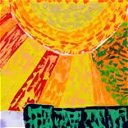
06.26.15 (Tammuz 9, 5775) "The LORD looks down from heaven upon the children of man to see if there are any who have sense and seek God" (Psalm 14:2). God breathed into us a living soul that hungers for divine connection (Gen. 2:7), and yet so many are turned to vanity and emptiness... When, by a miracle of grace we receive the truth and abide in it, we understand that God created the heaven and earth and all that exists (Psalm 115:15; 146:6). We awaken to the truth of reality, the "invisible things of Him are clearly seen," and we are filled with yirat shamayim (יראת שמים), the fear and wonder of God. In this way our lives are set apart and sanctified. We recognize that God brought our soul into existence from nonexistence, creating us in love, giving us life, breath, hunger, dreams, and the need for healing. God prepares a place for you; He welcomes you before His presence; He gives you a future and an eternal good because of your trust in his salvation.
בְּרוּכִים אַתֶּם לַיהוָה עשֵׂה שָׁמַיִם וָאָרֶץ
be·ru·khim · a·tem · ladonai · o·seh · sha·ma·yim · va·a·retz

"May you be blessed by the LORD,
who made heaven and earth"
(Psalm 115:15)

The Gift of Life...

06.26.15 (Tammuz 9, 5775) "For the invisible things of him from the creation of the world are clearly discerned, being understood by the things that are made…" (Rom. 1:20). The very first kindness that God bestows upon you is the miracle of your existence itself, namely, that he "wove you together" in your mother's womb (תְּסֻכֵּנִי בְּבֶטֶן אִמִּי) and brought you into being from nonexistence (Psalm 139:13). This is the gift of life (מַתַּת הַחַיִּים מִן הַשָּׁמַיִם). In Him you "live and move and have your being" (Acts 17:28). You were created b'ahavat olam (בְּאַהֲבַת עוֹלָם), in everlasting love, and indeed God knew you before you were born (בְּטֶרֶם אֶצּוֹרְךָ בַבֶּטֶן יְדַעְתִּיךָ) (Jer. 1:5; 31:3). You are "fearfully and wonderfully made," a unique soul that bears the handiwork of heaven itself. God's love and mercy sustains your days; the LORD compasses you "behind and before" and lays his hand upon you; He knows all your ways (Psalm 139:1-5). Indeed, God prepares a place for you and calls you to join him at the celebration of his love given in Yeshua.
בְּטֶרֶם אֶצּוֹרְךָ בַבֶּטֶן יְדַעְתִּיךָ
וּבְטֶרֶם תֵּצֵא מֵרֶחֶם הִקְדַּשְׁתִּיךָ
נָבִיא לַגּוֹיִם נְתַתִּיךָ
be·te·rem · e·tzor·kha · va·be·ten · ye·da·ti·kha
u·ve·te·rem · tei·tzei · me·re·chem · hik·dash·ti·kha
na·vi · la·goy·im · ne·ta·ti·kha

"Before I formed you in the womb I knew you,
and before you were born I consecrated you;
I appointed you a prophet to the nations."
(Jer. 1:5)

The Breaking of Moses...
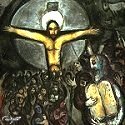
[ The following concerns this week's Torah reading, parashat Chukat... ]
06.25.15 (Tammuz 8, 5775) In our Torah for this week (i.e., Chukat), we read that after Miriam had died, the people again complained about the lack of water, and God instructed Moses to "speak to the rock" to satisfy their thirst. However Moses - perhaps still grieving over the death of his sister - then rebuked the people, saying: "Hear now, you rebels: shall we bring water for you out of this rock? And he lifted up his hand and struck the rock with his staff twice, and water came out abundantly, and the congregation drank, and their livestock" (Num. 20:10-11). The LORD, however, was not pleased by this representation and said to Moses and Aaron, "Because you did not believe in me (יַעַן לא־הֶאֱמַנְתֶּם בִּי), to reveal me as sacred in the eyes of the people of Israel, therefore you shall not bring this assembly into the land that I have given them" (Num. 20:12). ... Stunned silence ...
Jewish commentators have long struggled to understand this tragic episode, wondering whether it was because Moses had lost his temper with the people, or whether he had arrogantly claimed to be able to bring forth water by himself, or whether he had simply failed to obey God's explicit instruction to speak to (rather than to strike) the rock... We desire a straightforward explanation, a clear reason why God punished Moses and Aaron, but we are left wondering, questioning, struggling... And yet perhaps this is the point of the narrative – that there are reasons known only to God, and we must surrender our need to resolve the ambiguity of the outcome by means of trust. We might resist this solution, this great "cloud of unknowing," and we may continue searching, asking questions, and wondering; and yet often enough we discover there are no definitive answers, and even if we should accept a tentative one, our solution will inevitably lead to even further questions. As it is written: "One thing God has spoken, two things I have heard" (Psalm 62:11), which means that the Torah leads us to think, to enter into dialog, to search for truth. With one word, we often hear two things, which suggests the process of understanding in light of trust. Indeed we often hear and only later are able to listen to what was heard.
The Scriptures do not command us to believe "on cue," but rather reveal a world of questions for our hearts to ponder. Indeed, instead of regarding the Bible as a "Book of Answers" for our questions, it is worthwhile to think of it as a "Book of Questions" for our answers. As we listen, God questions us so that we can know him by means of the dialog within our hearts. As any good teacher knows, when a student earnestly wrestles with a question he learns more than if he were given a straightforward answer. Similarly, the Lord gives us permission to be without answers so that we will be free to seek, to struggle, and to "own" what we come to understand through our relationship with him... That way our learning will be real, substantive, and born from the urgency our own inner need. Indeed, God's very first question to man is always, ayekah: "Where are you?" (Gen. 3:9), which appeals for us to acknowledge how we hide from the truth. "Where are you?" is the poignant call of the Seeking Father for his lost child, and the question only becomes "our own" when we are willing to look at how we've come to be at this place in our lives. God's question to our heart is meant to lead us out of hiding to respond to his loving call...
Note: Of course Moses eventually made it into the Promised Land, as revealed in the account of the "transfiguration" of Messiah given in the Gospels (Matt. 17:3-4; Mk 9:4-5), and therefore the prophetic reason he was forbidden to enter the land after the Exodus from Egypt may have been to symbolize the need for Yehoshua (Joshua) to arise for Israel.
Mother of the Golden Calf...

[ The following concerns this week's Torah reading, parashat Chukat... ]
06.25.15 (Tammuz 8, 5775) Some of the sages have said that the ritual of the Red Heifer (פָרָה אֲדֻמָּה) was intended to atone for the sin of the Golden Calf (egel ha-zahav). The Golden Calf represents seeking for life in this finite world, losing sight of the invisible, unnamable, and mysterious Creator and Redeemer. Idolatry expresses our fear of being abandoned in the desert, and impels us to seek for security and comfort in the immediacy of the moment. The ritual of the Red Heifer brings us face to face with our contact with death and offers us purification and healing. The cow itself symbolizes our impulse to idolatry, which must be turned entirely to dust and ash in the fires of God's truth. To this are added cedar, representing our pride, and hyssop, representing our lowliness. A crimson string is added that symbolizes our blood connection and lower nature (דּם). All these are burned together and the ashes mixed with living water to create a holy admixture that heals us from the perversity of death. Ironically, we are cleansed from the "dust and ashes" of death by being sacrificially covered with God's "dust and ashes" given in our place.
Torah of Hope...
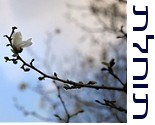
06.25.15 (Tammuz 8, 5775) Some people seem to think that we first must repent and then we will encounter the Lord, but it's actually the other way around: we first encounter the Savior and then we learn the meaning of repentance. Thus Paul's eyes were opened after he was first blinded by the light (Acts 9:3-6). Likewise, it is only after we have met the Lord that we begin to understand our blindness of heart, but as learn to see more clearly, we encounter more and more of his love (Rom. 5:20). As Yeshua said, "My yoke is pleasant (χρηστὸς) and my burden is light (Matt. 11:30). Repentance, then, is a progressive and ongoing process of awakening, as we learn to love God and to accept ourselves, despite our struggle with sin. As Anselm prayed: "O Lord, grant us grace to desire thee with all our hearts, that so desiring, we may seek and find thee, and so finding thee, may love thee, and loving thee may hate those things from which you have redeemed us."
A prayer to the One calling you to come: "I come to you just as I am - needy, sick within, weary, and broken... I come seeking your love; I come because you invited me to come: I open my heart, such as it is, to you; please join me here, in this place of my need, in this place of pain, and wrap me your comfort. I can only love you as I know your love, Lord Yeshua, so please help me to know your love in the truth. Amen."
Today if you hear...

06.24.15 (Tammuz 7, 5775) Think of today, this immediate hour... Now is the time we have to turn to God for life. Do not delay until the next day; do not say, "Tomorrow I will turn with all my heart." We only have this day, this hour to make our stand: tomorrow is a different world. As it is said, "For he is our God, and we are the people of his pasture and the sheep of his hand, today -- if we hear his voice and do not harden our hearts" (Psalm 95:7-9). We are warned not to "harden our hearts," that is, not to lose sight of real hope by refusing to trust in the promises of God's love...
"Teach us to number our days..." (Psalm 90:12). The sages say on the day of death, one considers one's life as if it had been a single day... Life goes by so quickly, and we never know when our personal "Rosh Hashanah" will come. "No one knows the day or hour..." That's why it is so vital to be healed and to turn to God while there is still time. So turn to him today and bacharta ba'chayim (בָּחַרְתָּ בַּחַיִּים) - "choose life!" "For this commandment (of turning to God in teshuvah) is not hidden from you, and it is not far away. It is not in heaven... nor across the sea.... Rather, the matter is very near you - in your mouth and your heart - to do it" (Deut. 30:11-14; Rom. 10:8-13).
לִמְנוֹת יָמֵינוּ כֵּן הוֹדַע
וְנָבִא לְבַב חָכְמָה
lim·not · ya·me·nu · ken · ho·da
ve·na·vi · le·vav · chokh·mah

"Teach us to number our days
that we may get a heart of wisdom."
(Psalm 90:12)

Download Study Card
Despite the frailty and tenuous brevity of our days, may it please the LORD God to shine the power of His radiance upon us, and to establish our works for His praise. May He help us to "number our days" so that we may obtain levav chokhmah (לְבַב חָכְמָה) - a heart of wisdom to live according to His will (James 1:5). Above all else, may the "God of our Lord Yeshua the Messiah, the Father of Glory (אֲבִי הַכָּבוֹד), impart to you a spirit of wisdom and of revelation in the knowledge of Him (רוּחַ הַחָכְמָה וְהֶחָזוֹן לָדַעַת אתוֹ), having the "eyes of your hearts" (ὀφθαλμοὺς τῆς καρδίας) enlightened, that you may know what is the hope to which he has called you" (Eph. 1:17-18). May you be strong, resolute, and fully focused on our LORD, and may God make this real for us: Amen.
Note: Where it is written, "God gave them over to their stubborn hearts, to follow their own devices" (Psalm 81:12; Rom. 1:24); and "they went backward and not forward" (Jer. 7:24), we learn there is no place of "neutrality" or indifference toward God... We are either going forward with Him or going backward from Him; we are either drawing near or pulling our hearts away... (Rev. 3:16). As Heschel once rightly said, "God is of no importance unless He is of supreme importance" (Man is Not Alone). As it is said, "For he is our God, and we are the people of his pasture and the sheep of his hand, today -- if we hear his voice and do not harden our hearts" (Psalm 95:7-9). We are warned not to "harden our hearts," that is, not to lose sight of real hope by refusing to trust in the promises of God's love.
God's Radiant Light...
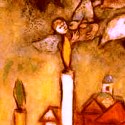
06.24.15 (Tammuz 7, 5775) In the Gospel of John it is recorded that Yeshua said, "I am the way, the truth, and the life" (i.e., ᾽Εγώ εἰμι ἡ ὁδὸς καὶ ἡ ἀλήθεια καὶ ἡ ζωή), no one can come to the Father apart from my hand" (John 14:6). The Greek word translated "truth" in this verse is aletheia (ἀλήθεια), a compound word formed from an alpha prefix (α-) meaning "not," and lethei (λήθη), meaning "forgetfulness." Truth is therefore a kind of "remembering" something forgotten, or a recollecting of what is essentially real. Etymologically, the word aletheia suggests that truth is also "unforgettable" (i.e., not lethei), that is, it has its own inherent and irresistible "witness" to reality. People may pretend or even lie to themselves, but ultimately the truth has the final word... "The light shines in the darkness, and the darkness has not overcome it" (John 1:5).
כִּי־עִמְּךָ מְקוֹר חַיִּים
בְּאוֹרְךָ נִרְאֶה־אוֹר
ki · im·me·kha · me·kor · chai·yim
be·or·kha · nir·eh · ohr

"For with you is the fountain of life;
in your light do we see light."
(Psalm 36:9)

Hebrew Study Card
"In Your light we see light..." When you enter a dark room with a lamp, the darkness flees and is overcome by the light. So also with teshuvah: When we turn to the Lord spiritual darkness is overcome by the Divine Radiance. In Yeshua is life, the light of the world; those who receive Him behold ohr ha'chayim (אוֹר הַחַיִּים) - the "light of life."
Gospel of Red Cow...

[ The following concerns this week's Torah reading, parashat Chukat... ]
06.23.15 (Tammuz 6, 5775) Unlike all other sacrifices offered at the mizbeach (altar at the Mishkan), the Red Heifer (פָרָה אֲדֻמָּה) was taken outside the camp and there slaughtered before the priest, who then took some of its blood and sprinkled it seven times before the Tabernacle (thereby designating it as a purification offering). During the Second Temple period, the High Priest performed this ceremony while facing the Holy of Holies while atop the Mount of Olives. Then the red heifer would be burned in its entirety: its hide, flesh, blood, and even dung were to be burned (unlike other Levitical sacrifices). Also unlike other offerings, the blood of the sacrifice was to be burned in the fire. This is extremely noteworthy, since blood was otherwise required to be poured beside the altar before being offered.... Hyssop, scarlet yarn, and a cedar stick would then be thrown upon the burning red heifer, the same items used to cleanse from tzara'at ("leprosy"). In other words, the blood was assimilated into the ashes of the sacrifice, which were then mixed with water to create the "waters of separation" (i.e., mei niddah: מֵי נִדָּה) for the Israelite community. Note that the word "separation" (niddah) harkens to the prophecy of Zechariah: "On that day there shall be a fountain opened for the house of David and the inhabitants of Jerusalem, to cleanse them from sin and from niddah" (Zech. 13:1).
Anyone (or anything) that came into contact with a corpse (the embodiment of sin and death) was required to be purified using the mei niddah. The purification procedure took seven days, using stalks of hyssop dipped into the water and shaken over the unclean person on the third day and then again on the seventh day. After the second sprinkling, the person undergoing the purification process would be immersed in a mikvah and remain in a state of impurity until the following evening.
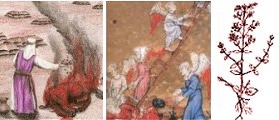
The paradox of the red heifer sacrifice suggests profound truth about the sacrificial death of Yeshua our Savior. The kohen (priest) who sprinkled the ashes of the red heifer became tamei (unclean) himself, even though the defiled person became tahor (pure). The picture of the priest here is one of sacrificial love - the giving up of one's own spiritual purity so that another person can regain his purity... "Sprinkle me with hyssop, and I will be clean" (Psalm 51:7). Just so, Yeshua willingly became unclean on our behalf - through our contact with sin and death - so that we could become clean (Isa. 53:4, 2 Cor. 5:21, Gal. 3:3, Eph. 5:2, Titus 2:14). Because of Yeshua, the impure become pure, even though He became impure through His offering. Because of Him, we have been cleansed from our sins "by a better sprinkling" than that which the Tabernacle of Moses could afford (Matt. 26:28, Heb. 9:14, 12:24, Eph. 1:7, 1 Pet. 1:2,18-19, Rom. 5:9; Col. 1:14, 1 John 1:7, etc.).
The "fall" of man implies that we have contact with death - both inwardly and outwardly. The sacrifice of Yeshua as our "Red Heifer" cleanses us from all tumah and lovingly makes us clean before the Father. The "water and the blood" is part of the "olah sacrifice" of Yeshua for our redemption and purification before God at Moriah (John 19:34, 1 John 5:6). The water and blood flowing from His wounds are the means by which we are purified from sin and death... All this comes from the love (chesed) of God given in our Messiah and Savior.
Note: For more on this see the article, "The Gospel of Red Cow."
Refuse the lies of fear...
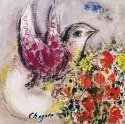
[ Since this world's propaganda constantly seeks to weaken us through fear, let me again urge you to always remember what is Real... ]
06.23.15 (Tammuz 6, 5775) Worry is a place of exile and pain. Since God's Name YHVH means "Presence" and "Love," to be troubled or anxious is to practice the absence of God's presence instead of practicing His Presence... We must "set the LORD" always before us (Psalm 16:8). Where it is written, "cast all your anxiety on him because he cares for you" (1 Pet. 5:7), the word translated "anxiety" (μέριμνα) comes from a Greek verb (μερίζω) that means to be fragmented or divided into parts and pieces. Fear divides the soul and weakens the resolve to be healed... To be made whole, to find inner peace, we must confess our brokenness and receive again God's love and care for our lives.
אַל־תִּירָא כִּי עִמְּךָ־אָנִי אַל־תִּשְׁתָּע כִּי־אֲנִי אֱלהֶיךָ
אִמַּצְתִּיךָ אַף־עֲזַרְתִּיךָ אַף־תְּמַכְתִּיךָ בִּימִין צִדְקִי
al ti·ra ki im·me·kha a·ni; al tish·ta ki a·ni E·lo·he·kha
im·matz·ti·kha af a·zar·ti·kha, af te·makh·ti·kha bi·min tzid·ki

"Fear not, for I am with you; be not dismayed, for I am your God;
I will strengthen you, I will help you, I will uphold you with my righteous right hand."
(Isa. 41:10)

Download Study Card
Take comfort that your Heavenly Father sees when the sparrow falls; he arrays the flower in its hidden valley; and he calls each star by name. More importantly, the Lord sees you and understands your struggle with fear... Bring to Him your needy heart and trust in His provision and care... As we look to Him, we will be seen -- and our dread of being invisible, irrelevant, and insignificant will itself vanish.
Note that the meaning of God's Name (YHVH) was initially revealed to Moses as simply ehyeh (אֶהְיֶה), "I AM," or "I WILL BE" (Exod. 3:14), though it is wonderful to understand that His Name is also revealed as ehyeh imakh (אהְיֶה עִמָּךְ), "I WILL BE WITH YOU" (Josh. 1:5,9; Isa. 41:10,13; John 10:28; Matt. 28:20, etc.). Just as the LORD is called Elohei ha-ruchot lekhol basar (אֱלהֵי הָרוּחת לְכָל־בָּשָׂר), "the God of the breath of all flesh" (Num. 16:22), so He is the Source of your breath, the One who exhales to you nishmat chayim (נִשְׁמַת חַיִּים), the "breath of life" that enables you to live (Job 12:10). Indeed the Name YHVH (יהוה) first appears in the Torah in regarding imparting the breath of life to Adam (Gen. 2:7). Note further that each of the letters of the Name YHVH represent vowel sounds (i.e., breath), suggesting again that God's Spirit is as close as your very next breath. Like the wind that cannot be seen, so is the spirit the essential part of your identity. Yeshua breathed on his followers and said, "Receive the Holy Spirit" (John 20:22).
"Fear not, for I am with you..." אַל־תִּירָא כִּי עִמְּךָ־אָנִי. What we need most of all is right here, present in this hour, whether we're conscious of it or not. God is with you, even if you feel alone, lost in darkness, unclean, afraid... "Dear Lord Jesus, I don't know who I am, I don't know where I am, and I don't know what I am, but please love me" (prayer of a sufferer from Alzheimer's disease). That's what we need most, to trust that we are safe in God's love, and that's the ultimate message of our atonement in Messiah.
Engraved Upon His Hands...

[ The following concerns this week's Torah reading, parashat Chukat... ]
06.22.15 (Tammuz 5, 5775) The Hebrew word "chok" means a "divine decree," derived from a verb meaning "to engrave" (חָקַק). The sages say that the word is directed to a desire to do God's will that is "engraved" upon the heart rather than simply understood with the intellect (2 Cor. 3:3). The first time "chok" (חוֹק) appears in the Torah concerns Abraham's obedience of faith as demonstrated by the sacrifice of his beloved son (Gen. 26:5), and the second time concerns the sacrifice of the Passover: "This day shall be for you a memorial day, and you shall keep it as a feast to the LORD; throughout your generations, as an eternal decree (חֻקַּת עוֹלָם), you shall keep it as a feast (Exod. 12:12-13). Because both the Akedah and the sacrifice of the Passover lamb reveal God's yeshuah (יְשׁוּעָה), his salvation, we are to engrave the significance of our deliverance within our hearts forever... Amen, just as God Himself has so engraved us upon his own heart, it is written, "behold, I have engraved you on the palms of my hands" (הֵן עַל־כַּפַּיִם חַקּתִיךְ) - Isa. 49:16a.
Beauty for Ashes...

[ The following entry concerns this week's Torah reading, parashat Chukat. Please read the Torah portion to "find your place" here. ]
06.22.15 (Tammuz 5, 5775) The ashes of the red heifer represented the death and sacrifice of something extremely rare, valuable, and precious. The ashes were mixed with "living water" (מַיִם חַיִּים) to reveal the truth that though the end of all flesh is but dust and ashes, the Spirit gives cleansing and life. Indeed the word ashes (אֵפֶר) may be rearranged to spell both cure (רַפֵא) and beauty (פְאֵר). The author of the book of Hebrews argues from the lesser to the greater: If the sprinkling of water mixed with the ashes of a red heifer purify the flesh from contamination with physical death, how much more does the blood of Messiah purify the soul from the deeds that cause spiritual death? (Heb. 9:13-14). Indeed, because of Yeshua's sacrifice we are given "beauty for ashes, the oil of joy for mourning, the garment of praise for the spirit of heaviness," that we may be called oaks of righteousness, the planting of the LORD, that He may be glorified (Isa. 61:3).
Our Wounded Healer...
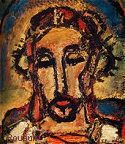
[ The following entry concerns our Torah reading for this week, parashat Chukat... ]
06.21.15 (Tammuz 4, 5775) Our Torah portion this week (Chukat) begins, zot chukat ha-Torah (זאת חֻקַּת הַתּוֹרָה), "this is the decree of Torah" (Num. 19:2). The language here is both striking and unique, suggesting that what follows is "the seminal decree" of the entire Torah... If we think about the meaning of the mysterious decree of the red heifer, however, we will realize that its ashes were used to create the "waters of separation" (i.e., mei niddah: מֵי נִדָּה) to cleanse people from contact with death (i.e., separation). To fulfill God's vital decree, however, required sacrificial love, since the priest who offered this service would become defiled (separated) for the sake of the healing of others... The Hebrew word for love is ahavah (אַהֲבָה), from a root verb (יָהַב) that means "to give." Love means giving of yourself to benefit another person (John 15:13). The central decree of Torah, then, beyond our ability to rationally understand, is that God's love is so great that it is willing to become dust and ashes on our behalf so that we might find blessing and life...
The mitzvah of parah adamah (i.e., the red heifer) represents the suspension of logic in deference to the Divine Will. This attitude is not restricted to this mitzvah. Scripture introduces the mitzvah of the parah adamah with the words "this is the law of the Torah." Surrendering one's own reasoning and accepting the superior reasoning of Hashem is the law of the entire Torah... To the extent that we let go of our own will, we can understand the Divine will. Our ancestors at Sinai understood this ideal when they proclaimed, "we will do and then we will understand." Torah is not beyond our understanding, but we must be willing to make the sacrifices that true Torah understanding demands. - Living Each Day, Rabbi Abraham Twerski
Yeshua willingly became unclean on our behalf - through contact with our sin and death - so that we could become clean (Isa. 53:4, 2 Cor. 5:21, Gal. 3:3, Eph. 5:2, Titus 2:14). The pure became impure through His sacrificial offering. Because of Him, we have been cleansed from our sins "by a better sprinkling" than that which the Tabernacle of Moses could afford (Matt. 26:28, Heb. 9:14, 12:24, Eph. 1:7, 1 Pet. 1:2,18-19, Rom. 5:9; Col. 1:14, 1 John 1:7, etc.).
Suffering Hope...
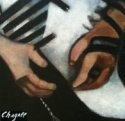
06.20.15 (Tammuz 3, 5775) If you receive no solace for your suffering; if you find no ready comfort despite repeated appeals to heaven; then you must surrender your heartache, your grief, and your troubles to God in complete trust of his overarching will: "My Father, if this cannot pass unless I drink it, your will be done" (Matt. 26:42). In this way you sanctify your suffering, trusting in God's care, even if you have been grieved by various trials (1 Pet. 1:6). Do not second-guess your trust; ask God for help and firmly believe that the One who knows the number of the hairs on your head also intimately knows this matter as well...
יְהוָה נָתַן וַיהוָה לָקָח
יְהִי שֵׁם יְהוָה מְברָך
Adonai · na·tan · vadonai · la·kach
ye·hi · shem · Adonai · me·vo·rakh

"The LORD gave and the LORD has taken away;
may the Name of the LORD be blessed."
(Job 1:21)

Hebrew Study Card
Job questioned the meaning of his life in light of his relentless suffering: "Cursed is the day that I was born... Why did I not die at birth, come out from the womb and expire? ... Why is light given to him who is in misery, and life to the bitter in soul?" (Job 3). Job's friends, so full of "piety" and religious wisdom, were quick to offer "God's answer" for his pain, though of course they did not really speak for God at all, but simply sought to protect themselves from facing their own fears... They needed an explanation to justify their own life, and therefore they sought to rationalize Job's torment. "God is perfect and never unjust," they insisted, and therefore Job's suffering was punitive, the result of his hidden sin, and ultimately intended to be corrective... Job rejected such religious platitudes and the notion of a "karma-based" theodicy, and instead directly appealed for heaven's vindication. Finally God allowed Job to voice his lament and to vent his pain and outrage, and only then - after Job had finished his case - was the revelation of God's mystery and love disclosed...
What Job didn't need were glib answers, cheap talk, shallow certainties, and sanctimonious mumbo-jumbo... To be truly healed, Job needed to give voice to his pain, to struggle to receive God's care, and to rediscover the meaning and wonder of the Divine Presence despite his afflictions... Job needed someone safe to share his burden with, a friend who "sticks closer than a brother" (Prov. 18:24). Thank God for Yeshua, who feels the pain of our infirmities and intercedes for us with heaven's own sympathy (Heb. 4:15-16).
Our First and Last Amen...

06.19.15 (Tammuz 2, 5775) The first letter of the Hebrew alphabet, the letter Aleph (א), pictures the Word of God, the Holy Beginning. Aleph is "three-in-one," constructed from two Yods (representing "hands") joined by a diagonal Vav (representing a man). One Yod (י) reaches upward while the other reaches downward, and both extend from the "fallen" Vav (ו) that pictures a "wounded Man" or Mediator (1 Tim. 2:5). In the Hebrew numbering system, Yod = 10 and Vav = 6, so adding up the three parts of Aleph yields 26, the same value as the Name of the LORD, YHVH (יהוה). All of this linked together, friends. The very first letter of the alphabet, the "king of the letters," pictures the loving Word of God who mediates heaven and earth so that we can experience and know the meaning of God's redeeming love. Similarly, the first letter of the Bible is the Bet (בּ) in bereshit (בְּרֵאשִׁית), and the last is the Nun (ן) in amen (אָמֵן). Put together, we have ben (בֵּן), the Hebrew word for "son." Yeshua, God the Son, therefore is rightly called "the Amen, the faithful and true witness, the beginning of God's creation" (Rev. 3:14). He is the "radiance of the glory of God" (זוֹהַר כְּבוֹדוֹ), the "exact imprint of his nature," the One who upholds (φέρων) the universe by the very word of His power (Heb. 1:3).
The Jewish sages say that "amen" serves as an declaration of the Kingship of God (often said quietly before the reciting the Shema) that may be understood as an acronym for the phrase El Melekh Ne'eman (אֵל מֶלֶךְ נֶאֱמָן): "God (אֵל) is a faithful (נֶאֱמָן) king (מֶלֶךְ)." For all the promises of God find their "Yes" in the Messiah. That is why it is through him that we utter our Amen to God for his glory" (2 Cor. 1:20).
 |
Personal Update: Please keep me in your prayers, friends, as I make mention of you all before our LORD. After some further testing at the hospital, it turns out that I also have Campylobacteriosis," an infection by the Campylobacter bacterium, probably from food of some kind... Please pray for my healing from this dreadful (and painful) infection, friends. Thank you. Shabbat Shalom and every blessing be yours in our Beloved Messiah (Eph. 1:3).
The Warning of Korah...

[ The following entry concerns this week's Torah reading, parashat Korach... ]
06.19.15 (Tammuz 2, 5775) The example of Korah is a severe warning for us not to transgress what God has ordained lest we incur severe judgment... In this connection let me remind you that the terms of the New Covenant (בְּרִית חֲדָשָׁה) are non-negotiable, and those who attempt to come before God apart from the cross - that is, apart from the shed blood of Messiah for atonement - likewise encroach upon the Divine Presence. Moreover, it needs to be stated that simply believing that Yeshua is the promised Messiah is insufficient for salvation. In the Book of Galatians, Paul invoked a divine curse on anyone who denied that the work of Yeshua is all we need to be justified and declared righteous by God (Gal. 1:8-9). Those who therefore claim that "something more" is needed than the finished work of Messiah (e.g., circumcision, law-keeping, etc.) remain under the curse (חֵרֶם) demanded by the law (Gal. 3:10; John 3:36). This is not a mere difference of opinion regarding how people are "justified" before God, since Paul goes on to make the case that those who teach otherwise are not truly saved -- even if they should profess that Yeshua is the true Messiah and Savior of Israel! Therefore Messianic teachers who falsely claim that Christians must "follow the law" to be made right with God are liable to the curse of the law. These people are not simply misinformed; according to Paul and the witness of the Holy Spirit, they are actually lost souls. "Beware of the leaven of the Pharisees," chaverim...
It's been wisely said that we must "unlearn" a lot during the days of our sojourn in this world, and that is especially true for people who still assume that they know something about life. "If anyone imagines that he knows something, he does not yet know as he needs to know" (1 Cor. 8:2). And it is also true, I'm afraid, for religious people, that is, for those who regard spirituality as a litany of "do's and don'ts" or a recipe of rituals rather than as receiving the miracle of new life given to us by the miracle of God.
"Anyone who has set aside the law of Moses (תּוֹרַת משֶׁה) dies without mercy on the evidence of two or three witnesses. How much worse punishment, do you think, will be deserved by the one who has trampled underfoot the Son of God, and has profaned the blood of the covenant (דַּם הַבְּרִית) by which he was sanctified, and has outraged the Spirit of grace?" - Heb. 10:28-29
A Future of Hope...

06.19.15 (Tammuz 2, 5775) It's been said that the will of God will never lead us to a place where the love of God will not keep us.... Indeed the very Name of the LORD (יהוה) means "Presence" (Exod. 3:14) and "Compassion" (Exod. 34:6-7). Yeshua said, "I go to prepare a place for you," which means that his love and presence are waiting for you in whatever lies ahead. Heed the message of the Holy Spirit: "For I know the plans I have for you, declares the LORD, plans for healing and not for evil, to give you a future and a hope (Jer. 29:11).
כִּי אָנכִי יָדַעְתִּי אֶת־הַמַּחֲשָׁבת
אֲשֶׁר אָנכִי חשֵׁב עֲלֵיכֶם נְאֻם־יְהוָה
מַחְשְׁבוֹת שָׁלוֹם וְלא לְרָעָה
לָתֵת לָכֶם אַחֲרִית וְתִקְוָה
ki · a·no·khi · ya·da·ti · et · ha·ma·cha·sha·vot
a·sher · a·no·khi · cho·shev · a·lei·khem · ne·um · Adonai
mach·she·vot · sha·lom · ve·lo · le·ra·ah
la·teit · la·khem · a·cha·rit · ve·tik·vah

"For I know the thoughts I have for you, declares the LORD,
thoughts for healing and not for evil, to give you a future and a hope."
(Jer. 29:11)

Hebrew Study Card
The message of the cross is that our lives matter to God. We are "am segulah," a treasured people, called to walk in the zeal of God's love (1 Pet. 2:9; Titus 2:4). Your life has great value; you are significant and you are truly loved by our Heavenly Father. There is a "future and a hope" reserved for you (Jer. 29:11); there is "a white stone, and on that stone will be written a new name that no one can understand except the one who receives it" (Rev. 2:17). May you trust in the Lord be'khol levavkha, with all your heart... Amen.
The Projection of Korah...
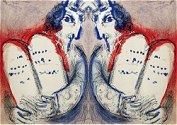
06.18.15 (Tammuz 1, 5775) In our Torah reading this week (Korach), Moses' cousin Korah accused Moses of self-aggrandizement and superiority by saying, "Why do you exalt yourself above the assembly of the LORD? ... Is it a small thing that you have brought us up out of a land flowing with milk and honey to kill us in the desert, that you also make yourself a prince over us?" (Num. 16:3,13). The Talmud comments: "One who seeks to disqualify another projects his own defects upon him." Korah's own self-exaltation and vanity led him to suppose that Moses was likewise proud and vain. His envy so twisted his perspective that he saw good as bad and bad as good. For him Egypt was the land "flowing with milk and honey" and Moses - not Pharaoh - was the real tyrant! In this connection the Baal Shem Tov said that other people serve as mirrors, and the defects we see in them reflect our own. Korah needed to see that his envy of Moses was rooted in fear, and that healing would come if he would let go and trust that God was in control of his life.
We can learn from the madness of Korah -- as well as his terrible end... "As you judge another you condemn yourself, for you that judge do the same things" (Rom. 2:1). How you react to another person reveals what is within your own heart, and this provides the opportunity to find healing by doing teshuvah and extending compassion to yourself. When you condemn another you are hurting yourself, after all. It is not a matter of factual truth as much as it is of the truth of hope and love. As we forgive others, so we find our own forgiveness (Luke 6:37), but if we insist on our rights, we find ourselves in hell... Fire offered falsely will be answered by the fire of God's judgment.
Note: For much more on this subject, see "The Madness of Korah."
Marks of False Teachers...
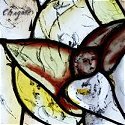
06.18.15 (Tammuz 1, 5775) False teachers tend to be "people pleasers." They desire the esteem of the crowd, the praises of men, and therefore appeal to the murmurings of the unregenerate heart: "Do not prophesy to us what is right; speak unto us smooth things, prophesy deceits" (Isa. 30:10). They flatter people by "tickling their ears"; they offer either platitudes or "new revelation" based on their own imagination. Consequently, they tend to be grandiose and quick to disparage God's faithful servants. Thus Korah accused Moses of wanting to exalt himself, when this only disclosed the evil lurking within his own heart (Num. 16:3). False teachers speak in their own name and presume to be something when they are nothing (Gal. 6:3). "The prophets prophesy lies in my name: I sent them not... they are prophesying to you a lying vision, the deceit of their own minds" (Jer. 14:14). They secretly deny that Yeshua is LORD (יהוה), though they may offer "lip service" about his importance (2 Pet. 2:1). Instead of focusing on the message of the gospel and the greatness of salvation found in Messiah, they "major in minors," passing over the weightier matters for the sake of various divisive doctrines (Matt. 23:23). They desire to be teachers of the law, but they have no idea what they are talking about (1 Tim. 1:7). Often such deceivers have natural charisma, charm, "good hair," and an ability to bewitch people through buttery oratory or clever presentation (Col. 2:4,8). Often they focus on the truth of the head rather than the truth of the heart; they are more concerned with being vindicated than healing broken hearts. Finally, they tend to exploit people to promote their own self-serving agenda (1 Pet. 2:1-3). They make "merchandise" out of the gullible, regarding them as the means to support their "ministry" rather than as precious souls in need of God's love and care...
False teachers inevitably "twist the Scriptures" by offering unsound interpretations contrary to the ruach, or spirit of the Hebrew prophets, and by evading the commandment to "rightly divide" the word of Truth according to basic logic and clear thinking (2 Tim. 2:15; 2 Pet. 1:20-21; 3:16). In Christian circles, they often come in the name of the law (legalism) or in the name of grace (licentiousness), but rarely do they take the trouble to carefully (and equitably) work through the paradoxical tensions. False teachers are uncomfortable humbly confessing they don't know something, and therefore they are quick to style themselves as an infallible prophet or source of authoritative wisdom...
There is no substitute for taking the time and energy to humbly study Torah, friends, and we should be suspicious of those who claim special insight when it is evident that they have not really labored working through the Scriptures... All disciples of Yeshua are called "students," or talmidim (תַּלְמִידִים), a word that comes from lamad (לָמַד) meaning "to learn" (the study of Scripture is called talmud Torah (תַלְמוּד תּוֹרָה) from the same root). Among other things, then, following Yeshua means becoming a student of the Jewish Scriptures that he both loved and perfectly fulfilled (Matt. 5:17-18; Luke 24:44-45). Only after learning the truth of the Scriptures will you be equipped to "go to all the nations and teach" others (Matt. 28:19). This is accomplished not merely by explaining (propositional) doctrine but by kiddush HaShem -- sanctifying the LORD in our lives (1 Pet. 1:15-16). "You shall know them by their fruits..."
Note: For more on this, see "Marks of False Teachers: Further thoughts on Korach."
Matters of Life and Death...

[ The following entry concerns this week's Torah reading, parashat Korach. Please read the Torah portion to "find your place" here. ]
06.18.15 (Tammuz 1, 5775) We read in our Torah portion the terrible fate of Korah and his co-conspirators: "And the earth opened its mouth and swallowed them up" (Num. 16:32), which the sages say metaphorically refers to being consumed by this world and its desires. Life is a serious business, an irrepeatable opportunity. Many trifle their way to the grave, fully unprepared for the shock of the world to come... How few make it the great business of life to prepare themselves "until their change comes" (Job 14:14); how few consciously number their days to obtain a heart of wisdom (Psalm 90:12)? We mustn't fool ourselves by thinking we have a long road ahead before we face who we are at the time of our death (Luke 12:19-21). "No one knows the day or hour," yet it is certain to come, and wisdom bids us be prepared. All must die; there is no escape (Heb. 9:27; Eccl. 8:8). In light of this somber truth, do you reflect on its significance? Have you taken time to see how it will be for you at your death? Allow such thoughts to awaken you from your careless and unwatchful state, and admonish you to lay up treasure in heaven (Matt. 6:20). Considering the vastness of eternity, human life is likened to a mere vapor that quickly passes away (Psalm 103:15-16). It is madness to put off that which is of ultimate concern until the last moment.
אֵין אָדָם שַׁלִּיט בָּרוּחַ לִכְלוֹא אֶת־הָרוּחַ
וְאֵין שִׁלְטוֹן בְּיוֹם הַמָּוֶת
וְאֵין מִשְׁלַחַת בַּמִּלְחָמָה
וְלא־יְמַלֵּט רֶשַׁע אֶת־בְּעָלָיו
ein · ah·dahm · sha·leet · bah·roo·ach · leekh·loh · et · ha·roo·ach
ve·ein · sheel·tohn · be·yohm · ha·mah·vet
ve·ein · meesh·la·chat · ba·meel·chah·mah
ve·lo · ye·ma·leit · re·sha · et · be·ah·lahv

"No man has power to retain the spirit,
or power over the day of death.
There is no discharge from this war,
nor will wickedness deliver those who are given over to it."
(Eccl. 8:8)

Of course dying in the LORD assumes you are really "in Him," that is, that you are a person whose heart is known by Him (1 Cor. 8:3). You can't die in him if you have never lived in him. In this world we learn to die, and as we die in Him, so we will live in him. Resolve this within your heart: "Blessed are the dead who die in the Lord" (Rev. 14:15).
Concerning the prospect of death we are not without hope, of course, since Yeshua has overcome death for us and secured our place in heaven (John 11:25; Heb. 2:9-10). "We must all die; we are like water spilled on the ground, which cannot be gathered up again. But God will not take away life, and he devises means so that the banished one will not remain an outcast" (2 Sam. 14:14). Though physical life inevitably returns us to dust (Heb. 9:27), death does not have the final word, since God wonderfully "devises the means by which the banished are brought back home." If you belong to the Lord, your death is the day of precious homecoming to be with your beloved Savior: "For me to live is Messiah, and to die is gain" (Phil. 1:21). As it is written, "just as we have borne the image of the man of dust, we shall also bear the image of the man of heaven" (1 Cor. 15:49).
Abraham Heschel once wrote, "God is of no importance unless he is of supreme importance." Stated differently, it is impossible to be indifferent toward God. Today we are on the way to face our destiny, even if we suppress this truth through busyness and other distractions. Again, life is a vapor; no one knows the day or hour of death; so we must endeavor to make our peace with God, to serve him in readiness, and so be prepared for whatever may come. Should we deny the reality of our death, we risk wasting our days, being seduced into the mere semblance of life. After all, what is life apart from life in Jesus?
Blaise Pascal once wrote: "I can feel nothing but compassion for those who sincerely lament their doubt, who regard it as the ultimate misfortune, and who, sparing no effort to escape from it, make their search their principal and most serious business. But as for those who spend their lives without a thought for this final end, I view differently. This negligence in the matter where they themselves, their eternity, their all are at stake, fills me more with irritation than pity: yea, it astounds and appalls me... (Pensees, 427). Regarding such need for spiritual sobriety, Kierkegaard comments: "Listen to the cry of a woman in labor at the hour of giving birth - look at the dying man's struggle at his last extremity, and then tell me whether something that begins and ends thus could be intended for enjoyment."
The sages advise: "Repent one day before you die." But who knows the day of one's death in advance? Therefore live each day as if it were to be your last, and may God help you make the decision to "seek the LORD while He may be found; call upon Him while He is near" (Isa. 55:6). Amen. May the LORD quicken these matters to our hearts...
The Warning of Korah...

06.17.15 (Sivan 30, 5775) Our Torah portion this week (Korach) centers on the rebellion of Korah, a man who questioned God's authority and arrogantly sought to "intrude" into the office of the priesthood. It is noteworthy that his rebellion is explicitly mentioned only once in the New Testament - in the Book of Jude - as an example of the fate that awaits those false teachers who likewise despise God's law. Unfortunately, Jude's warning is often neglected today, probably because people feel uncomfortable over the prospect of God's judgment. After all, in our "politically correct" age, people have been indoctrinated to regard "tolerance" as the greatest of virtues and "intolerance" (even of evil) as the greatest of vices.... Most unbelievers don't mind hearing the "good news" of God's love, but they take exception when they are confronted with their personal duty to live according to the moral truth revealed in the Torah. False teachers within the church are dangerous because they feed on this sense of discomfort and attempt to rationalize it away. Jude identifies them as spiritual impostors who "work from the inside" to confound or obscure the truth of God. Such charlatans may appear to be "true believers," but their hidden agenda is to sow confusion and sin among God's children. They are proverbial "wolves in sheep's clothing" (Matt. 7:15). Jude's warning is especially important for us to heed in this present hour, because in the time immediately preceding the coming of the Messiah, spiritual deception and unbridled godlessness will greatly increase (2 Tim. 3:1-5).
Note: For more on this very important subject, see "The Message of Jude."
Lamentation and Loneliness...

06.17.15 (Sivan 30, 5775) Ah Lord, you have given me an incurable wound, a pain that refuses to leave my heart; for mi li va'shamayim? "Whom have I in heaven but you?" And there is nothing on earth that I desire besides you" (Psalm 73:25). I whisper to Thy heart, "You are my Lord; I have no good apart from you," and yet I am bound in this place of lonely exile, pining away in grief... My heart cries, ad-anah Adonai, "How long, O Lord, forever?" Nevertheless I affirm: "My flesh and my heart may fail, but God is the strength of my heart and my portion forever." There is nothing I seek apart from your "with me" Presence, O beloved Savior; therefore be true to your love and bear my way through these hours...
מִי־לִי בַשָּׁמָיִם
וְעִמְּךָ לא־חָפַצְתִּי בָאָרֶץ
mi · li · va·sha·ma·yim
ve·im·me·kha · lo · cha·fatz·ti · va·a·retz

"Whom have I in heaven but you?
And there is nothing on earth that I desire besides you."
(Psalm 73:25)
Breath of Life...
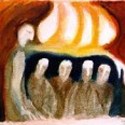
06.16.15 (Sivan 29, 5775) A verse from this week's Torah (Korach) reveals another great Name of God: Elohei ha-ruchot lekhol basar (אֱלהֵי הָרוּחת לְכָל־בָּשָׂר), which can be translated "the God of the breath of all flesh" (Num. 16:22). The LORD is the Source of your breath, the One who exhales to you nishmat chayim (נִשְׁמַת חַיִּים), the "breath of life" that enables you to live (Job 12:10). The sages use the analogy of a glassblower who creates a glass vessel. Just as the glassblower blows into a tube to form a vessel from molten glass, so the breath (i.e., neshamah: נְשָׁמָה) that comes from the LORD functions as spirit (i.e., ruach: רוּחַ) that forms and fills the human soul (i.e., nefesh: נֶפֶשׁ). Note that the Name YHVH (יהוה) first appears in this connection (Gen. 2:7), a Name that means "God is Present" (Exod. 3:14) and "God is Mercy" (Exod. 34:6-7). Note also that each letter of the Name YHVH represents a vowel sound (i.e., breath), suggesting that God's Spirit is as close as your very next breath. Like the wind that cannot be seen, so is the spirit the essential part of your identity. Yeshua breathed on his followers and said, "Receive the Holy Spirit" (John 20:22).
The special Name Elohei ha-ruchot lekhol basar appears only one other place in the Torah. After accepting the fact that he would soon die and therefore be unable to finally lead the people into the promised land, Moses prayed: "Let the LORD (יהוה), "the God of the spirits of all flesh" (אֱלהֵי הָרוּחת לְכָל־בָּשָׂר), appoint a man over the congregation who shall go out before them and come in before them, who shall lead them out and bring them in, that the congregation of the LORD may not be as sheep that have no shepherd." So the LORD said to Moses, "Take Joshua the son of Nun (יְהוֹשֻׁעַ בִּן־נוּן, lit. "son of life"), a man in whom is the Spirit (רוּח), and lay your hand on him" (Num. 27:16-18).
The Talmud notes that the word Nun (נוּן) means "fish," a symbol of activity and life. Joshua, the chosen one who succeeded Moses and led the people into the Promised Land, was the "Son of Life" - a clear picture of Yeshua our Messiah, the "spirit-filled good Shepherd" who would lay down His life for the sheep (John 10:11). The LORD is indeed the "God of the breath of all flesh." When Yeshua cried out, "It is finished" and breathed his last breath as He died for our sins upon the cross, the greatest exhalation of the Spirit occurred, the greatest sigh, the greatest utterance was ever declared. The sacrificial death of Yeshua for our deliverance was God's final word of love breathed out to those who are trusting in Him.
Courage and Humility...
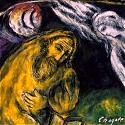
[ The following concerns this week's Torah reading, parashat Korach... ]
06.16.15 (Sivan 29, 5775) When Korah asked, "Why then do you exalt yourselves above the assembly of the LORD," Moses "heard it and fell on his face" (Num. 16:4). The sages comment that Moses' first thought was that perhaps Korah was sent by God to deliver a rebuke - that Moses was indeed guilty of vanity – and therefore he immediately fell on his face and began searching his own heart... In the face of criticism, Moses did not seek to defend or justify himself but instead looked within himself to ensure that his heart and his way was right before the LORD...
How do you react when you are criticized or rebuked? Do you seek to defend yourself or blame the other person for the same failure? The moment you sense pride taking hold of your heart, stop and turn to God. Even if you must turn 70 x 7 times, there is hope, since even the desire of "being willing to do God's will" refines the heart. It is far better to be repeatedly turning to God in brokenness than it is to live under the pretense that you have no need for ongoing deliverance. It has been wisely said that "you cannot widen the narrow way of surrender." Religious leaders are perhaps most at risk here, since often enough they fool themselves into believing that passionate commitment requires they know everything about God, or that they are walking in joy and victory, when the truth is that they are often lonely, hurting, and sometimes unsure of themselves...
I wonder why people are afraid to admit they don't know something, or that they are confused, or sad, or troubled, etc. Any religion that demands its adherents to always be "up" and is simply untrue to the human condition. Reread the Psalms or consider the dark walk of faith that many of our forefathers and foremothers underwent. God wants all our hearts, chaverim, not just the parts we think he wants.... "By the grace of God I am what I am" (χάριτι δὲ θεοῦ εἰμι ὅ εἰμι). "Face the facts of being what you are, for that is what changes what you are" (Kierkegaard).
"O LORD our God, grant us the serenity to accept the things we cannot change; the courage to change the things we can, and the wisdom to know the difference..." Amen....
The Desire of Faith...

06.16.15 (Sivan 29, 5775) "Blessed are they who hunger and thirst for righteousness..." (Matt. 5:6). What good would it do to have an angel reveal all mysteries and knowledge to you apart from the struggle to learn, to labor, and to make the truth of love your own? The sages say there is something more precious than even wisdom, and that is holy desire, the holy struggle to take hold of the heavenly blessing and to accept your new name (Gen. 32:27-28). When you experience holy desire, you feel a great longing and yearning for God, and this feeling becomes so intense that you do not know what to do, you do not know what to say, you do not know how to pray, and so you simply cry out to God, you cling to him in desperate hope and plead to know his heart directly...
רְצוֹן־יְרֵאָיו יַעֲשֶׂה
וְאֶת־שַׁוְעָתָם יִשְׁמַע וְיוֹשִׁיעֵם
re·tzon-ye·rei·av ya·a·seh
ve·et · shav·a·tam · yish·ma · ve·yo·shi·eim

"He fulfills the desire of those who fear him;
he also hears their cry and saves them."
(Psalm 145:19)

Hebrew Study Card
Beginning with Aleph...

06.15.15 (Sivan 28, 5775) The Hebrew letter Aleph (א) is the first letter of the first word of the first commandment of God: anokhi (אָנכִי): "I AM" (Exod. 20:2), which also designates the Name ehyeh (אֶהְיֶה) that was first revealed to Moses (Exod. 3:14). The numerical value of Aleph is one, indicating its preeminence, and it is a silent letter, alluding to the ineffable mystery of God's sovereign will (the related word aluph (אַלּוּף) means "Master" or "Champion"). In the Hebrew script used for writing Torah scrolls (ketav Ashurit), Aleph is constructed from two Yods (that represent "hands") joined by a diagonal Vav (that represents man). One Yod (י) reaches upward while the other reaches downward, and both extend from the "fallen" Vav (ו), picturing a "wounded Man" or Mediator (1 Tim. 2:5). In the Hebrew numbering system (i.e., gematria), Yod = 10 and Vav = 6, so adding up the three parts of Aleph yields 26, the same value as the Name of the LORD: YHVH (יהוה). The very first letter of the Hebrew Alphabet, then, pictures the three-in-one LORD who mediates all of life for our salvation. And just as there are three parts to Aleph, but Aleph is One (echad: אֶחָד), so there are three Persons to the Godhead, yet God is absolutely One. Indeed, the gematria of the word Aleph (אָלֶף) is 111 (Aleph=1, Lamed=30, and Pey=80). As Yeshua said, kotzo shel yod: every "jot and tittle" of Scripture is significant...
In this connection also note that the Hebrew word for "man" is adam (אדם), which is made up of dam (דם), "blood," and Aleph (א), which represents the LORD, as indicated above... The LORD turns flesh and blood into nefesh chayah (נֶפֶשׁ חַיָּה), a "living soul." Yeshua is our Aleph, the One who took on flesh and blood to mediate God's presence to us: with Him we are made real; we come alive; we are born from above (1 John 5:12).
Vanity and Separation...

06.15.15 (Sivan 28, 5775) "Now Korach took..." The Sefat Emet notes that the Aramaic targum (translation of the original Hebrew) reads, "Now Korach divided (himself)..." He took for himself another way, with no regard for the heritage of his people; he separated himself from the welfare of others. The sages also note that "he took" is written singular (וַיִּקַּח) because in the midst of the conspiracy with the sons of Reuben, there was dissent – each of the factions was only in it for his own personal glory. But as Yeshua warned: "A divided house cannot stand" (Matt. 12:25), and the fall of Korach and his conspirators was great.
Chief Seats at Synagogue...
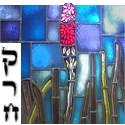
[ The following entry concerns this week's Torah reading, parashat Korach. Please read the Torah portion to "find your place" here... ]
06.15.15 (Sivan 28, 5775) Our Torah this week begins, "And Korah took" (וַיִּקַּח קרַח), which immediately suggests something about the character of the man. Though he was wealthy, highly esteemed among his tribe, and honored with the task of caring for the Ark of the Covenant, none of this was enough for Korah... There was an insatiable hunger, a "black hole" in his soul, an unrelenting envy, that drove him to madness and self-destruction. Korah was imprisoned by his own jealousy, arrogance, and spite. When he compared himself to Moses and Aaron, he felt overlooked, deprived, and therefore he justified in his desire to be honored. As an archetypal figure, Korach warns us against being swallowed up with egotistical envy or seeking the praises of men (Matt. 23:6-7). In the Kingdom of heaven, worldly success is sheer delusion. There are open and hidden riches. There is a pearl of great price, a treasure "hidden in a field." These riches are regarded as "fool's gold" to those who love this world and trust only in the realm of the phenomenal, but to those who trust in the LORD, they represent all that the heart needs...
The son of Zoma said: "Who is wise? He who learns from all people, as it is said: 'From all those who taught me I gained understanding' (Psalm 119:99). Who is strong? He who conquers his evil inclination, as it is said: 'Better is one slow to anger than a strong man, and one who rules over his spirit than a conqueror of a city' (Prov. 16:32). Who is rich? He who is satisfied with his lot, as it is said: 'When you eat the toil of your hands you are fortunate and it is good for you' (Psalm 128:2). 'You are fortunate' - in this world; 'and it is good for you' - in the World to Come. Who is honored? He who honors others, as it is said: 'For those who honor Me will I honor, and those who scorn Me will be degraded'" (1 Sam. 2:30). – Avot 4:1
Note: For more on this topic, see the article, "The Madness of Korah."
Pouring out of Heart...

06.14.15 (Sivan 27, 5775) A pious man once complained to the Kotzer Rebbe that it was difficult for him to earn a living. The rebbe counseled him to pray to God to have mercy upon him. The man replied that he didn't think his prayer would avail with the Almighty. The rebbe then said, 'If that is your feeling, then you have a much greater problem than lack of livelihood! You should be more upset that you do not know how to pour your heart out before God!" Indeed our Scriptures teach us to come "boldly" before the Throne of Grace (παρρησίας τῷ θρόνῳ τῆς χάριτος) that we may receive mercy (רַחֲמִים) and find grace (חֶסֶד) to help in time of need" (Heb. 4:16). Note that the Greek word translated "boldly" in this verse (παρρησίας) comes from πᾶς (all) + ῥέω (to utter), suggesting that we can speak freely to God and share everything within our heart without fear or shame.
בִּטְחוּ בוֹ בְכָל־עֵת עָם
שִׁפְכוּ־לְפָנָיו לְבַבְכֶם
אֱלהִים מַחֲסֶה־לָּנוּ סֶלָה
bit·chu · vo · ve·khol-et · am
shif·khu · le·fa·nav · le·vav·khem
E·lo·him · ma·cha·seh-la·nu · se·lah

"Trust in him at all times, O people;
pour out your heart before him;
God is a refuge for us. Selah."
(Psalm 62:8)

Pouring out your heart to God in an honest, transparent, and earnest way is called hitbodedut (הִתְבּוֹדְדוּת). After we "talk our hearts out" before the Lord, in our emptiness we can begin to truly listen, as it says, "In returning and rest you shall be saved; in quietness and in trust shall be your strength" (Isa. 30:15). Only after we sigh deeply and surrender are we receptive to the voice of the Spirit's whisper. "Blessed are all those who wait for Him" (Isa. 30:18). We wait, we abide, even when God takes his time or does not immediately intervene. We do not lose heart, for we find strength when we trust in God's love... The Light of the world still shines: Yeshua, be my inner word, my heart, and my groaning for life today, and forevermore, amen.
Remember the One who poured out his heart for our healing before the Father, in the agony of his passion and in his heart's suffering unto death for our sake... Few words were spoken, but groans, cries, gasps for breath, and the steadfast resolution to offer up the last drop of his blood for our healing and life... Pouring out of heart is not about the words we use, but the fullness of heart being presented: "When you pray, rather let thy heart be without words than thy words be without heart" (Bunyan).
Note: I am in a period of waiting for very needful healing at this time, and my groans arise in confidence to heaven... Please join your heart with mine for life....
The Rebellion of Korah...

[ The following entry concerns this week's Torah reading, parashat Korach... ]
06.14.15 (Sivan 27, 5775) Last week's Torah portion (Shelach) told the tragic story about the "sin of the spies" and the divine decree that the generation rescued from Egypt was sentenced to die in the exile of the desert. In this week's portion (Korach), the hard truth of their condition began to sink in, and the people bemoaned their fate and rebelled further by attempting to overthrow God's designated leadership and return to Egypt. This rebellion was instigated and organized by Moses' cousin Korach, who – along with a band of co-conspirators – was swiftly judged and put to death, thereby vindicating the Aaronic priesthood and Moses' leadership of Israel.
Korach was the cousin of Moses and a well-respected Kohathite who was honored to be one of the carriers of the Holy Ark. He was a wealthy man of influence - a nassi (prince) of the people. Despite all this privilege, however, Korach rationalized that he should be the head of the Kohathite clan (instead of his cousin Elzaphan), since he was the firstborn of Kohath's second son, whereas Elzaphan was not even a firstborn son. Indeed, because he felt slighted by Moses' choice, Korach went even further and brazenly questioned whether the office of the High Priest should not have been given to him – rather than to Aaron.
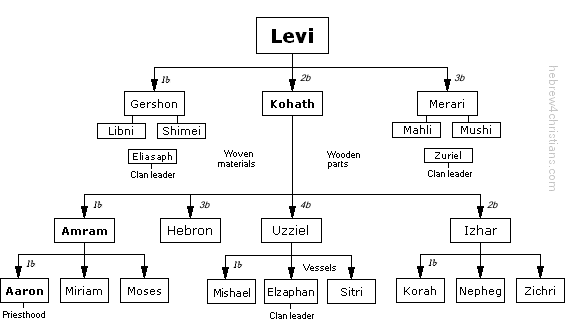 |
Korach's co-conspirators were two brothers named Dathan and Abiram from the tribe of Reuben, Israel's firstborn son. Together, they put together a force of 250 men to confront Moses and to challenge his exclusive claim to leadership: "You have gone too far! For all in the congregation are holy, every one of them, and the LORD is among them. Why then do you exalt yourselves above the assembly of the LORD?"
In response to their challenge, Moses proposed that Korach and his followers bring firepans to offer incense at the Tabernacle to determine whether they were indeed chosen to serve as priests. The following morning, when Korach and his 250 followers assembled at the gate of the Tabernacle to offer incense, God threatened to destroy them all instantly. Moses begged God not to destroy all the people, but only the rebels. He then warned the congregation to stand clear of the dwellings of Korach, Dathan, and Abiram. The earth then opened up and swallowed them alive, and a fire consumed the 250 men who illegitimately offered the incense...
Korach's rebellion introduced outright mutiny and chaos within the leadership of the camp that brought swift and terrible rebuke from the LORD. Nevertheless, the very next day the entire congregation of Israel audaciously began to accuse Moses and Aaron, saying: "You have killed the people of the Lord." When the people looked toward the Tabernacle, however, the Glory of the LORD appeared, where God descended to tell Moses and Aaron that he was going to destroy the Israelites for their treason. Despite Moses and Aaron's fervent intercession, however, a deadly plague broke out among the people. Moses then instructed Aaron to take his firepan with incense and to bring it in the midst of the congregation to make atonement for them. Aaron did so, "and he stood between the dead and the living; and the plague was stayed." The Torah tells us that 14,700 Israelites died because of the plague, not including the deaths of those involved in the rebellion of Korach.
As a final test to vindicate Aaron as God's chosen priest, each of the twelve tribal heads of Israel, as well as Aaron himself, were instructed to bring their staffs to Moses. Moses then inscribed their names on each staff and brought them into the sanctuary before the ark of the testimony. "And the staff of the man whom I choose shall sprout. Thus I will make to cease from me the grumblings of the people of Israel, which they grumble against you." The following day Moses went into the Tabernacle and "behold, the staff of Aaron for the house of Levi had sprouted and put forth buds and produced blossoms, and it bore ripe almonds." He then brought out all the staffs and gave them back to each of the tribal leaders. The LORD then told Moses to return Aaron's staff to the Tabernacle as a testimony for generations to come.
After all this transpired, the people began to dread the Presence of the LORD and the Tabernacle. To allay their fears, Moses gave them assurance that the sons of Aaron (i.e., the priests) and the Levites alone would bear responsibility for the sanctuary. But since the Levites and priests would receive no portion in the Promised Land, the people were instructed to generously support them by means of various gifts that are listed at the end of the Torah reading.
Descending to Ascend...
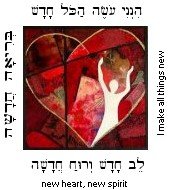
06.12.15 (Sivan 25, 5775) From our Torah this week we read: "I am the LORD your God, who brought you out of the land of Egypt to be your God: I am the LORD your God" (Num. 15:41). The sages note that "I am the LORD your God" (אֲנִי יְהוָה אֱלהֵיכֶם) is mentioned twice – once to emphasize that He is your Redeemer, and a second time to emphasize that He is your Healer... God brings us out of the depths to bring us in to his heart.
This is been a very hard week for me personally, but the LORD our God has seen me through it all, blessed be He. Shabbat Shalom and love to you in Yeshua our Savior, friends.
Faith's Groaning...

06.12.15 (Sivan 25, 5775) The Berditchever rebbe was asked if his ongoing debate with heaven - protesting that God was not dealing correctly with his people - was a sin of lashon hara (evil speech), to which he replied that the spies slandered God when they said, "We are not able to go up against this people, for they are stronger than us (Num. 13:31), yet his burden was rather, ad-anah Adonai, "How long, O Lord, will you forget us, forever?" (Psalm 13:1), and, "You who put the LORD in remembrance, take no rest, and give him no rest until he establishes Jerusalem and makes it a praise in the earth" (Isa. 62:6-7).
"For we know that the whole creation groans (συστενάζει) and suffers together until now. Not only this, but we ourselves also, who have the firstfruits of the Spirit, groan inwardly as we eagerly await our adoption, the redemption of our bodies. For in this hope we were saved" (Rom. 8:22-24).
The Fight for Love...
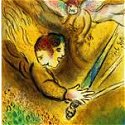
06.12.15 (Sivan 25, 5775) "Whatever does not proceed from faith is sin" (Rom. 14:23). Sin is not so much disobedience to an external code of behavior, however, as much as it is abandoning your trust, your identity, and your hope as a beloved child of God. As you believe so you will behave, and as you behave so you believe... Therefore one of the greatest of sins is to forget the truth of who you really are – a beloved and redeemed child of God! The great temptation of sin is rooted in the lie that we are unworthy people, that God does not really loves us (just the way we are), that He is disappointed in us, and so on. "Self-rejection is the greatest enemy of the spiritual life because it contradicts the sacred voice that calls us the "Beloved." Being the Beloved constitutes the core truth of our existence" (Nouwen). Forgetting who you are leads to forgetting who the Lord is, just as forgetting who the Lord is leads to forgetting who you are.... Therefore the Lord constantly tells us to remember and not to forget the call of his heart, the message of his love.
Sin seduces people to destroy themselves, since it first of all seeks to disown, impugn, and reject what is most important for spiritual life. The devil seeks to murder and destroy all that we need to be eternally healed... And though we might want to escape from this conflict (or to pretend that it's not really here), the battle is intractably real and must be fully engaged until our redemption is complete (1 Pet. 5:8-9). Meanwhile, spiritual struggles can be downright ugly. Would any one deny that the cross of Messiah was a sacred space - and yet it was precisely from there, from the place of blood and suffering and pain and terror, that the grace, beauty, and strength of God for us would shine forth.
To effectively combat the devil, let us first of all pray to the LORD God Almighty and ask for His power, wisdom, and grace to deal with the evil one's devices and strategies used against us (Eph. 6:11-18; Rom. 13:12, 1 Thess. 5:8; 2 Cor. 10:4-5). Since we are not to be ignorant of the devil and his devices (2 Cor. 2:11), let us particularly ask God to remind us of who we really are in the Messiah, and to give us the power of the Holy Spirit to genuine walk in the truth of our sacred identity as his beloved. Let's ask God to help us practically apply the victory given to us in the resurrection of Yeshua. With God's help, may we be bold to take our place at His banqueting table, assured that we are indeed His dear children...
Addendum: If anyone wishes to rely (exclusively) on 1 John 3:4 to "define" sin, let me gently remind you that to understand the meaning of that verse requires a thorough understanding of many concepts, including 1) John's use of the word "nomos" (translated "law"), 2) what "law" means in relationship to "covenant," 3) what "sin" means, and most importantly 4) what the entire point of salvation is about. The "lawful use of the law," Rabbi Paul said, is to constrain evil within the heart of people: "Now we know that the law is good, if one uses it lawfully, understanding this, that the law is not laid down for the just but for the lawless and disobedient, for the ungodly and sinners, for the unholy and profane, for those who strike their fathers and mothers, for murderers, the sexually immoral..." (1 Tim. 1:8-11). Sin is, above all else, breaking the heart of God, a refusal to receive his love, etc. For more on this vital subject, please see: "The Lawful Use of the Law."
Small in our Eyes...
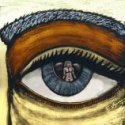
06.12.15 (Sivan 25, 5775) Our Torah portion this week (Shelach) is a "heavy one" since it focuses on the Sin of the Spies and the subsequent failure of the people to trust that God would care for them. The people's lack of bittachon in God is the most serious sin recorded in all the Torah, even more serious than the sin of the Golden Calf. This is confirmed by the testimony of the New Testament, which presents the fate of the Exodus generation as the dire warning of apostasy for those who claim to follow the Messiah (Heb. 3:7-4:2).
Notice, however, that in order to trust God, you must believe that you are valuable to Him and that He genuinely desires relationship with you. God redeemed you so you could know and love Him. In this connection it is important to notice that the spies said, "we were in our eyes like grasshoppers" (Num. 13:33). They felt small because they had forgotten the reason for their redemption - they had forgotten how much they meant to God. Their lack of self-respect made them feel unworthy of the inheritance. The sin of the spies was not just that they doubted they could overcome the "giants in the land," but rather that they were worthy people in God's eyes... Sadly the spies view of themselves was more real to them than God's view of them, and that is why they added, "and so we were (like grasshoppers) in their eyes." From a spiritual point of view, this was profoundly tragic...
One lesson we can learn from the unbelief of the spies is that we must be careful to esteem ourselves properly. We are created b'tzelem Elohim (in the image of God), and that is the starting point for everything else revealed in the Torah. This foundational idea may be expressed as "respect precedes Torah." Self-esteem and self-worth are very important characteristics because they enable the soul to receive the Word of God. This isn't a selfish, narcissistic type of love. If you have no self-worth, then it is likely you will believe the promises of Scripture are for other people, but not for you. You will regard yourself as an "outsider" or "alien" who is without promise of inheritance. So we have to begin there, with the fact that God created you in His image and therefore you are of infinite value. You matter to God - and therefore you must respect yourself. It is no mark of holiness to shame or belittle yourself - notwithstanding your sinful nature - since you have a duty to honor yourself as one of God's created children. Dishonoring yourself violates the central ethical commandment of the Torah: "You shall love your neighbor as yourself" (Lev. 19:18). How can you respect others if you don't respect yourself? You will regard yourself as "insect like" and will tend to view others as "gigantic" threats; you will act defensively and walk in fear of other people.... This is the path of a person living in a prison of fear, and it is a type of hell. Trusting in God's personal love for you presupposes that you are worthy to be loved and that there is a divine inheritance for you. This gives you real courage to go take possession of the land as its rightful heir. Trusting in God means regarding God's view of you as more real than your own. It means allowing yourself to be elevated to honor so that you can be in a genuine love relationship with your Heavenly Father. "From now on, therefore, we regard no one (including ourselves) according to the flesh..." (2 Cor. 5:16).
We "walk by faith, not by sight," which means we must take hold of the promise of God, even in a world that "devours its inhabitants" and that is filled of seemingly invincible giants... Faith believes the possible, even in moments of testing and struggle. As Yeshua said, "All things are possible for the one who believes" (Mark 9:23).
"Lord, I believe: help thou my unbelief!" (Mark 9:24). "God is able to make all grace overflow to you, so that having all sufficiency in all things at all times, you may overflow in every good work" (2 Cor. 9:8). May it please God our Heavenly Father to help us esteem ourselves properly so that we can receive, abide in, and walk in the reality and presence of His overflowing love. And may the LORD keep us all from the terrible sin of unbelief by always remembering that we infinitely matter to Him. Amen.
Faith's Projection....

06.12.15 (Sivan 25, 5775) The spies said, "we seemed to ourselves like grasshoppers, and so we seemed to them" (Num. 13:33). Here the sages note the subtle - yet profound - connection between how we see ourselves and how we imagine that others see us... This sort of "projection" is common enough in everyday life. However, while it may be valid for you to sometimes feel small, inadequate, and even "grasshoppery," it is not valid to claim that this is how you are regarded by others. After all, how do you know how you appear to others? And, moreover, what difference does that make in light of who God says you are? Who or what defines you? Do you need the approval of men to exist, or the approval of God? Worrying about how others see you, seeking your self worth among the fickle passions of men, is simply carnal and self-centered. When the spies said that "the land devours it inhabitants" (Num. 13:32), they projected their own hidden fears. Instead of seeing God at work, preparing the way for the Israelites to more easily conquer the land, the spies saw only themselves, and that led to their sin of unbelief...
Faith and Testing....

06.12.15 (Sivan 25, 5775) From our Torah this week (Shelach Lekha) we read: "They (the spies) returned... and brought word and showed them the land's bounty. And they said, "We came to the land to which you sent us. It flows with milk and honey (זָבַת חָלָב וּדְבַשׁ), and this is its fruit. Nevertheless the people who inhabit the land are powerful; the cities are greatly fortified, and we also saw the (giant) people of Anak there... We are unable to go up against the people there, for they are stronger than we are ... and moreover the land itself consumes its inhabitants" (Num. 13:25-32). The Kotzer rebbe asked, "Did the spies lie? Did they invent words that were untrue? Behold, they spoke as they saw it, so how did they sin?" Yet not everything that is not a lie is truth: you may have all the facts "correct" and yet still speak untruth. Truth is therefore more than the description of appearances, since what appears is constrained by what is ultimately real. Our Torah portion again illustrates the responsibility we have to trust in the good, regardless of whatever momentary obstacles and troubles we may be presently encountering...
Knowledge of God is not like that obtained by laboratory science. Empirical data is based on logical induction, repeatability, and assumes that cause and effect relationships hold. However, the methodology itself assumes far more basic things, for example, that the future will resemble the past; that measurement is possible; that causal connections are valid; and it further assumes that is better to know than to not know, and indeed that knowledge itself is possible. God gives witness by means of "argumentum spiritus sancti," the witness of the Holy Spirit, inner revelation that comes to the heart of faith.
But what about the trouble, testing, pain, hardship in our lives? How do we deal with these without losing heart? Only God can help us, friend... In this life, where our "outer man perishes" we will experience the "existential pathos" of the life of faith. That is the test. We may feel abandoned by God, or forgotten, or of complete insignificance, or sinful, vile, hopeless confused, and so on, and yet the heart of faith cries out: "Though he slay me, yet will I trust in him" (Job 13:15). Faith is able to see beyond the temporal to the eternal... It finds comfort in God's blessing to endure the ambiguities of this world. May the LORD God Israel, Yeshua our Messiah, strengthen us all. Amen.
Seeing with Heart...

[ The following concerns this week's Torah reading, parashat Shelach Lekha. Please read the Torah portion to "find your place" here. ]
06.11.15 (Sivan 24, 5775) "We walk by faith, not by sight." This is true for all people, since every soul lives by faith of some kind or another. Our Torah portion this week (Shelach) begins with the episode of the spies and concludes with the warning not to "spy after your heart and after your eyes" (Num. 15:39). The Torah mentions the heart first and then the eyes to indicate that the eyes follow the heart. We see as we believe with our heart: "According to your faith be it done unto you." When the spies said, "We are not able to go up (לא נוּכַל לַעֲלוֹת)... for they are stronger than us" (Num. 13:31), they revealed their unwillingness to believe in God's promise, or, to put it another way, they revealed their faith in God's inability to deliver on his word.... Indeed, the Hebrew word for "than us" (מִמֶּנּוּ) can also mean "than Him," suggesting that the spies believed that even God would be unable to uproot the Canaanites. According to their faith, so it was done; by believing that it was impossible, they lost the possibility of God's promise...
Faith sees what is possible and refuses to yield to the artificiality of mere appearance. Indeed, appearances are often a test of our courage. We may never know how often a test was given and - just before victory was manifest - the heart grew faint and was lost to fear. "According to your faith be it done to you" is a spiritual principle that applies to everyone. In that sense, it is not that we have faith that matters (since we all do), but whether our faith is grounded in the promises and power of the LORD God of Israel, or something else....
אָמַרְתְּ לַיהוָה אֲדנָי אָתָּה
טוֹבָתִי בַּל־עָלֶיךָ
a·mart · la·do·nai: · A·do·nai · at·tah
tov·va·ti · bal - a·ley·kha

"I say to the LORD, "You are my Lord;
I have no good apart from you."
(Psalm 16:2)

Hebrew Study Card
Health Update: I praise the LORD God of Israel, and I sincerely thank you my friends! The high fever broke last night and I am doing better... I haven't eaten for a few days but I have a renewed strength and am able to get out of bed. THANK YOU ALL FOR YOUR CONCERN! Your prayers have truly helped me get through this. Barukh atta Adonai Eloheinu, melekh ha'olam, ha'gomel lahayavim tovot, sheg'molani kol tov.
Please pray for John...

06.10.15 (Sivan 23, 5775) Here is a update on my tick bite and fever I am running. I went to the hospital today and they drew blood, ran some tests, and prescribed Doxycycline 100mg to offset the possibility of a Lyme infection. I am not doing well though, as my temperature is nearly 105 and my heart rate is up and down. My blood pressure is running higher than normal. Please remember me in your prayers. I am very disappointed not to be able to share with you right now, so let's pray for a speedy healing. Thank you my friends...
Faith and Truth...

06.09.15 (Sivan 22, 5775) Our Torah portion for this week begins: "The LORD spoke to Moses, saying, 'Send for yourself (שְׁלַח־לְךָ) men to spy out the land...'" (Num. 13:1-2). Finally, after all that the LORD had done for his people -- redeeming them from slavery, providing them miracles of manna and living water, and making covenant with them to be his set apart people -- the Israelites were given the opportunity to enter the promised land! The vision of Zion was about to be fulfilled! And yet they faltered; the reports of the spies discouraged and blinded them... In this connection, the sages taught that the Book of Ezekiel begins: "The heavens were opened and I saw visions of God." the first letters of which may be arranged to spell the Hebrew word for "faith" (אמונהֹ). Faith is a deeper type of seeing by which we are enabled to apprehend truth about reality...
Note: I was bitten by a tick (on my scalp) recently and now am running a high fever, have severe body aches, etc. Please pray for my healing, dear friends. Thank you.
The Path of Life...
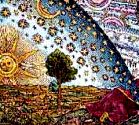
06.08.15 (Sivan 21, 5775) Spiritual regeneration or transformation isn't just leaving the sinful past behind you, but discovering the glory of true and infinite life that sustains all of reality... There is change of perspective, of no longer backing away from the hell you came out of by turning around to focus on heaven, your true spiritual home. We are called to pursue the goal of the upward call of God in Messiah (Phil. 3:14). If we walk in the light, the LORD will cause us to know "orach chayim," the path of life; we will find joy in the Divine Presence; and we will discover pleasures that will endure forever:
תּוֹדִיעֵנִי ארַח חַיִּים
שׂבַע שְׂמָחוֹת אֶת־פָּנֶיךָ
נְעִמוֹת בִּימִינְךָ נֶצַח
to·di·ei·ni · o·rach · chai·yim
so·va' · se·ma·chot · et · pa·ne·kha
ne·i·mot · bi·min·kha · ne·tzach

"You will cause me to know the path of life;
in your presence there is fullness of joy;
at your right hand are pleasures forevermore."
(Psalm 16:11)

Download Study Card
Our faith requires us to believe that God not only created us, but that he is infinitely interested in every moment of our lives... Have you discovered the glory and wonder of God's love, despite the many sins and the shame of your life? Do you know "in your gut" that his love means no longer having to defend or explain yourself? The love of God (ahavat HaShem) enables you to quit hiding what you really are from Him; you can give up the pretense of being something you're not. When you turn to the Lord in the transparency of your brokenness, weakness, and neediness, you will find Him there, accepting you for who you really are... The path of life is -- the path of life!
Joshua and Jesus...
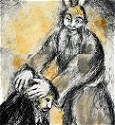
[ The following is related to this week's Torah reading, parashat Shelach... ]
06.08.15 (Sivan 21, 5775) Before sending out the leaders of the tribes to spy out the land, Moses renamed his trusted servant Hoshea (הוֹשֵׁעַ) to Yehoshua (יְהוֹשֻׁעַ), appending the letter Yod (י) to make his name begin with a divine prefixive (יָהּ־). The Talmud (Sotah 34b) states that Moses foresaw the treachery and faithlessness of the spies and appended the Yod to remind Hoshea that YHVH (יהוה) must come first. This renaming of Hoshea, however, was certainly prophetic, since Joshua was chosen to be the successor of Moses who would finally lead the people into the promised land. Notice that the name Yehoshua (i.e., Joshua) and Yeshua (i.e., Jesus) come from the same root (i.e., yasha: ישׁע) meaning "salvation" or deliverance (in the Greek LXX, Joshua is spelled Ιησους, the same spelling for Jesus in the New Testament). Indeed, in the Book of Nehemiah, Yehoshua is explicitly called Yeshua (יֵשׁוּעַ), the name often transliterated as "Jesus" (Neh. 8:17).
Note: There are a number of profound similarities between Joshua and Jesus revealed in the Torah. For more information see, "Joshua and Jesus: Further thoughts on Shelach..."
The Great Warning...

06.07.15 (Sivan 20, 5775) Our Torah reading for this week, Shelach Lekha (שלח־לך), recounts how Moses sent twelve spies from the region of Kadesh into the land of Canaan to search it out and give a report of its condition. The spies returned 40 days later extolling the land, saying that was indeed fruitful and zevat chalav u'devash (זָבַת חָלָב וּדְבַשׁ), "flowing with milk and honey." However, ten of the spies also gave a discouraging report, indicating their lack of confidence that the people could conquer the land. Only Joshua (יְהוֹשֻׁעַ) and Caleb (כָּלֵב) kept faith in God's promise. Upon hearing the report of the ten spies, however, the people rebelled and cried out to return to Egypt. Angered by their lack of faith, God sought to destroy the people, but Moses interceded on their behalf. The LORD then decreed to lengthen the Israelites' wandering in the desert to 40 years -- one year for each day the spies were in the land. All of the faithless generation of the Exodus over the age of 20 would die in the desert, except for Joshua and Caleb, the two spies who kept faith with the LORD. After hearing the judgment of God, a group of remorseful Israelites decided to "repent" by taking matters into their own hands. Without either the "ark of the covenant of the LORD" or Moses' leadership, they presumptuously decided to storm a mountain on the border of land, but were defeated by the Amalekites and Canaanites.
If last week's Torah was "sefer kvetch" (the book of complaint), this week's Torah reveals the fateful outcome... The people's lapse of faith in God's power serves as a profound and very sober warning, and indeed is a primary warning regarding the dreadful sin of unbelief in the New Testament (see Heb. 3:7-4:11). Indeed, Jewish tradition states that the decree that "none of the men who had seen my glorious Presence and my signs I performed in Egypt and in the desert will see the land that I swore to give to their fathers" (Num. 14:22-23) was given on the Ninth of Av (i.e., Tishah B'Av), and was prophetic of the destruction of the Temple and the worldwide exile of the people from the Promised Land.
Note: The tragedy of the sin at Kadesh ultimately has a happy ending, however, since the LORD is never thwarted by man's sin and weaknesses. After the 38 years of exile were complete, Moses' successor Joshua sent a second spying expedition to the promised land, though this time God led the spies to a prostitute named Rahab (רָחָב), a direct ancestor of Yeshua the Messiah, who later identified her faith in the LORD's victory by displaying the scarlet cord (חוּט הַשָּׁנִי) during the fall of Jericho (Joshua 2). Rahab was the (grand)mother of Boaz, who later married Ruth, the great grandmother of King David. May God likewise give us courage to walk in the power of His promises, even if our present circumstances seem daunting. May the LORD clothe each of us with the "spirit of David" to stand before all the giants of the land who defy the LORD and His power.
Finding Real Treasure...

06.05.15 (Sivan 18, 5775) For what do you hope? What are your dreams? Your deepest desires? Where is your treasure? Yeshua cautioned those who sought their happiness in this world: "Do not store up for yourselves treasures upon earth... be rich toward God" (Matt. 6:19-20; Luke 12:21). When we treasure God, our focus is directed toward the eternal reality, and our interest in this world is minimal. We trust God to meet our daily needs and surrender our future to His care. The only worry we face concerns our own deficiencies in our obligations to the Savior. Our duty is to love God in the truth - bekhol levavkha - with all our heart, having no thought of ourselves. Indeed, self-denial means to quit thinking about yourself (from α-, "not," + ῥέω, "to speak") by accepting what God has done for you. "It is not my business to think about myself. My business is to think about God. It is for God to think about me" (Simone Weil).
מִי־לִי בַשָּׁמָיִם
וְעִמְּךָ לא־חָפַצְתִּי בָאָרֶץ
mi · li · va·sha·ma·yim
ve·im·me·kha · lo · cha·fatz·ti · va·a·retz

"Whom have I in heaven but you?
And there is nothing on earth that I desire besides you."
(Psalm 73:25)

Download Study Card
Being Made Whole...
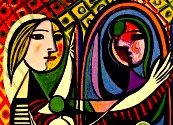
06.05.15 (Sivan 18, 5775) From our Torah this week (Beha'aolotekha) we read: "Make for you two silver trumpets, of hammered work you shall make it" (Num. 10:2). The trumpets were used to signal the assembly for special occasions, such as preparing for war. Dov Ber of Mezeritch noted that the word for "trumpets" (i.e., chatzotzrot: חֲצוֹצְרת) can be divided into two words, chatzi tzurot (הצי צורות), meaning "half forms" that were to be fashioned from one substance. Where it says, "Ve'ahavta – you shall love the LORD your God with all your heart," that includes both your "good heart" and your "bad heart" – that is, all of you, all of your being, the whole person. Come as you are, and God will unify your heart by the miracle of his grace, as David prayed: "Teach me your way, O LORD, that I may walk in your truth; unite my heart to fear your name" (Psalm 86:11).
הוֹרֵנִי יְהוָה דַּרְכֶּךָ אֲהַלֵּךְ בַּאֲמִתֶּךָ
יַחֵד לְבָבִי לְיִרְאָה שְׁמֶךָ
ho·re·ni · Adonai · dar·ke·kha · a·ha·lekh · ba·a·mi·te·kha
ya·ched · le·va·vi · le·yir·ah · she·me·kha

"Teach me your way, O LORD, and I will walk in your truth;
unite my heart to fear your Name."
(Psalm 86:11)

Note: The "desert experience" reveals what is hidden in our hearts... The murmuring and rebellion of the Israelites in the desert is our own, and our challenge is to find healing from our fears. Anger, doubt, boredom, cravings, and outright rebellion are symptoms of a deeper problem, and to change we must first confess our inner poverty, neediness, and emptiness (James 5:16). When we stop making excuses we can learn to trust in God's provision for our lives; we will taste of the heavenly manna and be satisfied; we will be delivered from our fears by be filled with God's love. The impulses that sought to lead us away from God will no longer be able to pretend to be the truth, since God's peace and love will direct the heart.
The Father of Light...

06.05.15 (Sivan 18, 5775) It is written in our Scriptures: "God is light and in him is no darkness at all" (1 John 1:5). Our Savior is "the Light of the world," the overarching Reality that gives light to every soul who is born (John 1:9). As the Source of all light, his power is irrepressible, invincible, and overcomes every shade of darkness. Yeshua is the Logos (Λόγος), the underlying "logic" of all of creation. Unlike the transient radiance of the heavenly bodies, the Divine Light remains constant and supreme over all of creation, without any diminution or variation: God is the "Father of Lights" (James 1:17). And just as we know that the sun still shines even on the most overcast of days, so we understand that the Divine Presence is always there -- always giving, always shining, always loving us... We can trust in the power of our God to help us, since His radiance and truth pervade the darkness to enlighten our way (Psalm 112:4). As Yeshua said of his mission, "I have come into the world as light, so that whoever believes in me may not remain in darkness" (John 12:46). O precious LORD our God, let your light shine upon us...
אֱלהִים יְחָנֵּנוּ וִיבָרְכֵנוּ
יָאֵר פָּנָיו אִתָּנוּ סֶלָה
E·lo·him · ye·chon·nei·nu · vi·var·khei·nu
ya·er · pa·nav · it·ta·nu · se·lah

"May God be gracious to us and bless us
and make his face to shine upon us, selah."
(Psalm 67:1)

Allow the light of God's love to shine in you brightly. As Yeshua our Savior said, "Whoever has my commandments and keeps them, such is the one who loves me. And the one who loves me will be loved by my Father, and I will love him and will manifest myself to him" (John 14:21). Note that the Greek word for "manifest" means to "shine inside" (i.e., ἐμφανίζω, from ἐν, "in" and φαίνω, "shine"), indicating that the revelation would be inward light of the Divine Presence. Indeed, the Hebrew word for "praise" (i.e., tehillah: תְּהִלָּה) comes from a verb that means "to shine" (i.e., halal: הָלַל), from which we derive the word "halo." Similarly, the word "aura" comes from the Hebrew word "ohr" (אוֹר), meaning "light." Let your inner light shine before others so that they may see your good works and give honor to your Father who is in heaven" (Matt. 5:16).
True spirituality is inner light that comes from union with the Messiah. "God is light, and in him is no darkness at all." We "walk in the light," experiencing inner peace and joy in the Holy Spirit when we heed and obey the Voice of God's love and abide in the secret place of His grace. The people of God are united to one another by the power of God's love. O LORD God, "light up my eyes lest I sleep the sleep of death" (Psalm 13:3). May the light and love of the Lord our God shine within you, friends. Shabbat Shalom!
Tending to the Light...
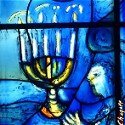
[ The following is related to this week's Torah reading, parashat Beha'alotekha... ]
06.05.15 (Sivan 18, 5775) In our Torah reading for this week, God gave instructions about how Aaron was to light the lamps of the menorah within the inner chamber of the Tabernacle. Each day Aaron was to clean each of the seven lamps and to refill them with the very purest olive oil. The wicks were then to be bent or positioned so that the six outer lamps projected their lights toward the seventh (and central) shaft. The lamps of the menorah were to be lit daily, "from evening until morning," in a specific sequence - starting from the central lamp (the shamash) and then moving right to left (Exod. 27:21).
The word beha'alotekha (בְּהַעֲלתְךָ) literally means "when you raise up" (from alah: עָלָה, "to ascend"), and in this context refers to the flames of the menorah kindled by God's priest. The sages say that the Torah uses this Hebrew word to imply that the daily lighting and tending of the menorah was an act of sacrificial worship (like an olah offering). Indeed, Aaron's service of lighting the menorah was entirely spiritual, symbolizing how the light of the heavenly realm is manifest in this world.
By extension, we also "raise up the lamps" by acting in faith, that is, by opening our eyes to believe in and to receive the Divine Light. We "tend to the flame" by caring for God's light and honoring the Shekhinah Presence. As we serve God by faith, we bear witness to the light of truth before others. As Yeshua said: "Let your light shine before others, so that they may see your good works and give glory to your Father who is in heaven (Matt. 5:16).
Receiving the Light...
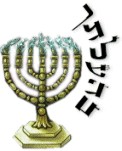
[ The following is related to this week's Torah reading, parashat Beha'alotekha... ]
06.05.15 (Sivan 18, 5775) From our Torah portion this week we read: "When you raise up the lamps, all seven lights shall face the menorah" (Num. 8:2), which the sages link to the inner light that shines as we believe in God's Presence. It is written, "The commandment is a lamp; Torah is light" (Prov. 6:23), which means that we are given inner light as we open our eyes to reality (John 13:17). Likewise it says: "the commandment of the LORD is pure, enlightening the eyes" (Psalm 19:8), since the commandment always focuses on God's Presence: "I AM the LORD your God" (אָנכִי יְהוָה אֱלהֶיךָ) is the starting point of all Torah...
כִּי נֵר מִצְוָה וְתוֹרָה אוֹר
וְדֶרֶךְ חַיִּים תּוֹכְחוֹת מוּסָר
ki · ner · mitz·vah · ve·to·rah · ohr
ve·de·rekh · chai·yim · to·che·khot · mu·sar

"For the commandment is a lamp, and the Torah is light,
and the reproofs of discipline are the way of life."

Download Study Card
Yeshua is the Living Torah (תּוֹרַת חַיִּים) and its spiritual Light, for through Him we are able to see (John 8:12). The numeric value of the word "lights" (i.e., אורות) is 613, the traditional number of commandments enumerated in the written Torah. Yeshua is the inner light and meaning of all that the written Torah says; indeed, He is the goal (i.e., τέλος, "purpose" or "reason") of all that the Torah teaches and the means of attaining righteousness for all who trust in Him (Rom. 10:4). Yeshua is ohr ha'chayim (אוֹר הַחַיִּים), the "light of life."
C.S. Lewis once wrote, "I believe in Christianity as I believe that the sun has risen: not only because I see it, but because by it I see everything else." As it is written in the Scriptures: "For with You is the fountain of life; in Your light do we see Light" (Psalm 36:9). Amen.
Seeking what Matters...
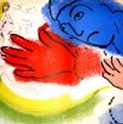
06.04.15 (Sivan 17, 5775) Our Torah portion this week (Beha'alotekha) recounts the rebellion of the people during the desert sojourn... Instead of joyfully anticipating the promise of their inheritance, the people grew dissatisfied and bored. The Sefat Emet noted that just after we read how the people complained bitterly to the LORD, they had a "strong craving" (הִתְאַוּוּ תַּאֲוָה), which in Hebrew literally means they "craved a craving." Moses could tolerate the people's desire for food and water, but when they began to actively cultivate their cravings, lusting after the imaginary "free fish" they enjoyed in Egypt, he began to realize that the problem was deeper, a matter of the heart... Moses understood that what the people really wanted was impossible, since it involved denying who they were as God's redeemed people. The issue was not about wanting "meat" to eat, after all, but rather hungering after the forbidden, desiring to desire, etc. Creating desires, fomenting a sense of deprivation, and choosing to see yourself as a victim, is a lethal sickness of spirit, a disease of the soul. It is a "burning" (i.e., Taberah: תַּבְעֵרָה) that destroys inner peace. May God help us understand and seek what truly matters; may he deliver us from self-destruction; and may he help us to be satisfied with the manna he provides! Amen.
"For I do not want you to be unaware, brothers, that our fathers were all under the Cloud, and all passed through the Sea, and all were baptized into Moses in the Cloud and in the Sea, and all ate the same spiritual food, and all drank the same spiritual drink. For they drank from the spiritual Rock that followed them, and the Rock was Messiah (הַצּוּר הַהוּא הַמָּשִׁיחַ). Nevertheless, with most of them God was not pleased, for they were overthrown in the desert. Now these things took place as examples for us, that we might not desire evil as they did. We must not put Messiah to the test ... nor grumble, as some of them did and were destroyed by the Destroyer. These things happened to them as an example, but they were written down for our instruction, on whom the end of the ages has come. Therefore let anyone who thinks that he stands take heed lest he fall" (1 Cor. 10:1-12).
Chaverim, let us ask the LORD to give us hearts that are full of godly contentment, which is "of great gain" (1 Tim. 6:6). May we be walking in true spirituality (רוּחָנִיּוּת) - in the power of the Holy Spirit (רוּחַ הַקּדֶש) - by practicing emotional honesty with ourselves and with God (James 5:16). Trials and tribulations - the "squeezing of grapes" - are part of the walk of faith, but we are invited to come "boldly" before the Throne of Grace (παρρησίας τῷ θρόνῳ τῆς χάριτος) to find help for our lives (Heb. 4:16). Note that the word translated "boldly" in this verse (παρρησίας) means that we can speak honestly and freely to God from the center of the chaos of our hearts -- without fear or shame. We don't need to conceal ourselves from the Divine Light, since this is the very Light that overcomes the hidden darkness within us. Those who accept that God is in complete control of their lives are set free from the terrible burdens of fear and anger. Abiding in ahavah shlemah (אַהֲבָה שְׁלֵמָה, God's "perfect love") means that you can let go...
יֵצֶר סָמוּךְ תִּצּר שָׁלוֹם שָׁלוֹם כִּי בְךָ בָּטוּחַ
בִּטְחוּ בַיהוָה עֲדֵי־עַד כִּי בְּיָהּ יְהוָה צוּר עוֹלָמִים
ye·tzer · sa·mukh · titz·tzor · sha·lom · sha·lom · ki · ve·kha · ba·tu·ach
bit·chu · vadonai · a·di-ad · ki · be·Yah · Adonai · tzur · o·la·mim

You will keep him in perfect peace whose mind is stayed on you, for he trusts in you.
Trust in the LORD forever, for Yah the LORD is an everlasting rock.
(Isa. 26:3-4)

Hebrew Study Card
The Name of the LORD is "I-AM-WITH-YOU-ALWAYS" (אני איתך תמיד), which implies that we always live within God's Presence and care, even if we are sometimes unconscious of this truth (Matt. 28:20). The Heart of God cries out, "Behold I have engraved you on the palms of my hands" (הֵן עַל־כַּפַּיִם חַקּתִיךְ; Isa. 49:16). Remember the One who stretched out his hands and died for your healing; remember that he said, "Do not be anxious about tomorrow... sufficient for the day is its own trouble" (Matt. 6:34). Again, "do not be anxious for any reason, but in everything by prayer and supplication with thanksgiving let your requests be made known to God, and the healing peace of God (שְׁלוֹם אֱלהִים) - the very shalom of heaven which surpasses all understanding - will guard your hearts and your minds in Yeshua the Messiah" (Phil. 4:6-7). "He's got the whole world in his hand," and we experience inner peace when our minds are settled on Him (Isa. 26:3).
Note: For more on this topic, see "Graves of Craving: Further thoughts on Beha'alotekha."
The Divine Light...
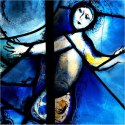
06.04.15 (Sivan 17, 5775) "If I say, surely darkness covers me ... the night shines as the day; nothing hides from your radiance" (Psalm 139:11-12). We have to trust that God is in our darkness, in the silence, in the unknown... You come out of the shadows when you admit that you act just like other people, that you are human, in need of reconciliation yourself... Above all you need God. You need help. You need a miracle to help you to truly love. You may find excuses for many things, but you cannot escape the "wretched man that I am" reality that is grounded in your fears. God sees in the darkness and is present there, too. When you feel alone, like an unbridgeable gulf lay between you and all that is good; when you feel like you want to scream but are afraid that even then no one would hear, may the LORD shine His light upon you...
גַּם־חשֶׁךְ לא־יַחְשִׁיךְ מִמֶּךָ
וְלַיְלָה כַּיּוֹם יָאִיר
כַּחֲשֵׁיכָה כָּאוֹרָה
gam · cho·shekh · lo · yach·shikh · mi·me·ka
ve·lai·lah · ka·yom · ya·ir
ka·cha·she·khah · ka·o·rah

"The darkness is not made dark to you;
but the night shines as the day:
as the darkness so is the light...
(Psalm 139:11)

"For it is you who light my lamp; the LORD my God outshines my darkness" (Psalm 18:28). There is "depression," and there is the dark night of the soul, and these are different matters, though they may overlap... "Hope deferred makes the heart sick." The dark night of the soul is an experience of trusting God in the darkness yet has a spiritual direction and end. We walk through this darkness with God and learn from him even there..
Branch of Righteousness...

06.03.15 (Sivan 16, 5775) The Haftarah (i.e., the portion from the prophets) for parashat Beha'alotekha includes reference to the great Tzemach Tzedakah (צֶמַח צְדָקָה) - the "Branch of Righteousness." Tzemach Tzaddik (צֶמַח צַדִּיק) is a metaphorical name for the Messiah, the offshoot of King David (Jer. 33:15). Of him the prophet Zechariah says, "Behold, a man called the Branch (tzemach) shall branch out (יִצְמָח) from the midst of the earth, and he shall build the Temple of the LORD (בָּנָה אֶת־הֵיכַל יְהוָה)" [Zech. 6:12].
This is a "dual aspect" prophecy, of course. The prophet Zechariah initially gave this message to Joshua (Yehoshua ben Yehotzadak) who was the High Priest at the time of the return of the Exile from Babylon, and tzemach may refer to Zerubavel in the immediate context. But note the prophet's parable: "Hear now, O Joshua the high priest, you and your friends who sit before you, for they are men who are a sign: behold, I will bring my servant the Branch" (Zech. 3:8). Shifting metaphors, the prophet then likens this "branch" to a stone: "For behold the stone that I have laid before Joshua; upon one stone shall be seven eyes: behold, I will engrave the graving thereof, saith the LORD of hosts, and I will remove the iniquity of that land in one day" (Zech. 3:9).
The LORD later instructed the prophet to crown Joshua (Zech. 6:10-13) signifying regal authority... So who is this who would combine priestly and kingly power on behalf of Israel and who would "remove the iniquity of the land in one day"? Who is this "Righteous Branch"? The prophecy says, הִנֵּה־אִישׁ צֶמַח שְׁמוֹ / hinei-ish tzemach shmo: "behold the man whose name is the Branch" (Zech. 6:12).

It must be remembered that God's high priest (kohen gadol) was never allowed to wear the crown of a king (separation of "church and state" goes back to the prophecy of Yaakov!). The scepter is Judah's -- and King Messiah would therefore come from the royal tribe of Judah (Gen. 49:10; see elsewhere this site regarding "Shiloh"). This picture, then, of a High Priest wearing the King's crown therefore goes beyond the various roles defined in the Levitical priesthood (i.e., the covenant at Sinai)...
The union of anointed King (i.e., Mashiach) and the High Priest was going to "bring peace" to Israel (Zech. 6:13). Yeshua is the One who will ultimately restore the Temple of the God of Israel in the truth. "In that day the LORD of hosts will be a crown of glory (עֲטֶרֶת צְבִי), and a diadem of beauty, to the remnant of his people" (Isa. 28:5).
Just as Joshua the high priest was graciously given robes of righteousness in exchange for his filthy garments (Zech 3), so we are given an imputed righteousness that comes through trusting in "the One who justifies the ungodly" (Rom. 4:5). "For our sake God made Him (i.e., Yeshua) to be sin who knew no sin, so that in him we might become the righteousness of God" (2 Cor. 5:21). This is a righteousness that is "apart from the law, though the law and prophets testified of it; namely, the righteousness of God given through the faithfulness of Yeshua the Messiah" (Rom. 3:21-22). Our present groaning for the complete deliverance is a gift given by the Spirit of God crying out within our hearts (Rom. 8:22-23).
רְאֵה הֶעֱבַרְתִּי מֵעָלֶיךָ עֲוֹנֶךָ
וְהַלְבֵּשׁ אתְךָ מַחֲלָצוֹת
re'eh · he'e·var·ti · me'a·le·kha · a·vo·ne·kha
ve'hal·besh · o·te·kha · ma·cha·la·tzot

"Behold, I have taken your iniquity away from you,
and I will clothe you with pure vestments"
(Zech. 3:4)

Note: For more on this great topic, see the "Branch of Righteousness" article.
The Chesed of Ruth...

[ The Book of Ruth is traditionally read during the holiday of Shavuot ("Pentecost")... ]
06.03.15 (Sivan 16, 5775) The Book of Ruth (מְגִלַּת רוּת) tells a marvelous story of redemptive love and devotion (i.e., chesed: חֶסֶד) dating back to the dark period of Jewish history known as the "time of the Judges" (c. 12th century BC). The story is traditionally read during Shavuot, both because the events recounted took place during the time of the spring harvest (linking it to the agricultural aspect of holiday), and Ruth herself is a picture of willing acceptance of a Jewish lifestyle (linking it to the religious aspect of the holiday). Just as Israel willingly accepted the Torah at Sinai without knowing its content (kol asher diber Adonai na'aseh v'nishmah), so Ruth gave up everything she knew to accept the Torah. Like the people of Israel, Ruth believed in order to understand, not the other way around...
Ultimately the story of Ruth illustrates that the law by itself is unable to redeem us (as illustrated by the unnamed 'redeemer' who did not wish to "mar" his inheritance), and therefore something more is needed. A true go'el (גאֵל), or "kinsman redeemer," is marked by love and compassion, just as the law of the Spirit of life (תּוֹרַת רוּחַ הַחַיִּים) is what sets us free from the law of sin and death (תּוֹרַת הַחֵטְא וְהַמָּוֶת). Ruth overcame the "letter of the law" by faith in God's redemptive love, just as Yeshua overcame the judgment of the law by means of God's greater love... Therefore like Ruth, we have to "go to the threshing floor" as a forbidden outsider to lay claim to the redeeming love of God; we have to say to the LORD, "Spread your wings over your servant, for you are my Redeemer" (Ruth 3:9). Indeed, by faith we have to push past the enmity required by the Torah with its commandments and ordinances to receive our healing - and to find our place within the family of God...
כִּי אֶל־אֲשֶׁר תֵּלְכִי אֵלֵךְ
וּבַאֲשֶׁר תָּלִינִי אָלִין
עַמֵּךְ עַמִּי וֵאלהַיִךְ אֱלהָי
ki · el · a·sher · tel·khi · e·lekh
u·va·a·sher · ta·li·ni · a·lin
a·mekh · am·mi · ve·lo·ha·yikh · E·lo·hai

"For where you go I will go
and where you lodge, I will lodge
your people shall be my people, and your God my God."
(Ruth 1:16)
In this connection it is interesting to see that King David's genealogy not only included the noble line of Abraham/Sarah, Isaac/Rebakah and Jacob/Leah, but it also included Judah/Tamar, Boaz/Ruth, and Salmon/Rahab. Moreover, in the genealogy of Yeshua the Messiah given in Matthew (1:1-16), only four women (besides Mary) are explicitly named: Tamar (who seduced her father-in-law), Rahab (a prostitute), Ruth (a Moabitess), and "the wife of Uriah" (i.e., Bathsheba, an adulteress). Each of these women of faith illustrate that God's love and grace overcomes His judgment. Here is a (very simplified) diagram I made to indicate some of the relationships:
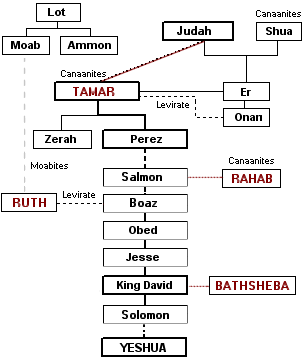 |
Ultimately, Ruth's teshuvah was accepted, even though she was an outcast - a Moabite of whom the Torah stated: "none of them may enter the assembly of the LORD forever" (Deut. 23:3). Ruth's great faith was not unlike that of the Canaanite woman who was accepted by Yeshua (Matt. 15:22-28). Both women overcome even the law of the Torah by faith in God's chesed and grace... In the case of Ruth, her faith enabled the House of David to come - and from this, the line of Yeshua our Messiah and Savior...
Note: For more on this subject, see "The Chesed of Ruth."
Menorah and Olive Trees..
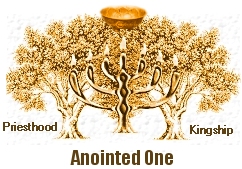
[ The following is related to this week's Torah reading, parashat Beha'alotekha... ]
06.03.15 (Sivan 16, 5775) In the prophet Zechariah's spectaclular vision of the menorah (Zech. 4:1-10), seven "pipes" (מוּצָקוֹת) led to each of the seven lamps - 49 pipes in all - indicating the perfection of the Spirit of God and recalling the Jubilee of Shavuot (Zech. 4:2). Two olive trees stand next to the Menorah, one on the right, and one on the left (Zech. 4:2-3). The two olive trees may picture the the kingship and the priesthood united in Yeshua our Messiah, or they may refer to Israel and the ekklesia, respectively. Zechariah then exclaims, "This is the word of God to Zerubavel: 'not by might or power, but by my Spirit, says the LORD of Hosts'" (Zech. 4:6). Note that the passage ends with the statement, "he shall bring forth the top stone (הָאֶבֶן הָראשָׁה) with shoutings of 'Grace, grace, unto it' (Zech. 4:7), a clear picture of the crowning glory of our Messiah and great High Priest, Yeshua...
For more on this subject, see "The Menorah and Tree of Life."
Light of the Servant...
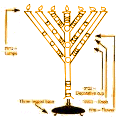
[ The following is related to this week's Torah reading, parashat Beha'alotekha... ]
06.03.15 (Sivan 16, 5775) Our Torah portion this week begins with the LORD instructing Aaron to kindle the seven lamps of the menorah (מְנוֹרָה) so that the light from each would be "turned" toward its central shaft (Exod. 25:37; Num. 8:4). The entire menorah was formed mikshah (מִקְשָׁה), that is, beaten from a single piece of pure gold (זָהָב טָהוֹר), and its base, shaft, branches, cups, fruits, and flowers were all "one" with its substance (Exod. 25:31). The central shaft upheld the light of the shamash (servant or helper lamp) which also served as the trunk for the other branches. The radiance of the menorah symbolized the Divine light (shamash can also be read shemesh, "sun"), which is the radiance of Yeshua, the Tree of Light and the great Servant of the LORD (John 8:12; 1 John 1:5). Yeshua is the light that gives light to every person created in the image of God (John 1:9). Our spiritual life stems from our connection with Him, since he provides us with support, sustenance, and illumination from the oil of the Holy Spirit (John 15:1-5)..
Yeshua is the Light of the LORD (אוֹר יי). As it is written, "God is our light and our yeshuah, our salvation" (Psalm 27:1; 1 John 1:5). He alone is the Light of the world (אוֹר הָעוֹלָם), the Shamash (שַׁמָּשׁ) who descends to ignite the "light of life" (אוֹר הַחַיִּים) within all who will believe. Our Savior is the Radiance (זוֹהַר) of the glory of God (Heb. 1:3), the Fire of God's holy countenance. The one who has the Son has life, but the one who refuses this life is spiritually dead. May we all walk in the Light of His countenance; "O house of Jacob, come, let us walk in the light of the LORD" (Isa. 2:5).
בֵּית יַעֲקב לְכוּ וְנֵלְכָה בְּאוֹר יְהוָה
bet · Ya·a·kov · le·khu · ve·nel·khah · be·or · Adonai

"O house of Jacob, come, let us walk
in the light of the LORD"
(Isa. 2:5)

Note: For more on the mystery of the menorah, see "The Menorah and the Tree of Life."
Torah of Miracles...
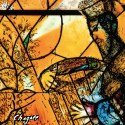
06.02.15 (Sivan 15, 5775) Perhaps you (like me) once learned Psalm 19:7 as, "The law of the LORD is perfect, converting the soul." However, the Hebrew text might better be translated as, "The instruction (i.e., Torah) of the LORD is perfect, returning the soul." This is the message of teshuvah (תְּשׁוּבָה), or "repentance." We turn away from ourselves to discover that only the love of God given in Yeshua gives life to our dead hearts (Mark 1:15). Teshuvah is therefore first of all a matter of faith, of trusting in the miracle of God. And though it is indeed a great gift from heaven, it requires that we pass through the "narrow gate" of humility by confessing the truth about who we are (Matt. 7:13). We turn away from our pride; we acknowledge our inner poverty, our neediness, and we mourn over the loss and hurt caused by our sin. Teshuvah turns us away from our attempts to defend or justify ourselves and instead turns to God to heal our separation from love (Rom. 8:3-4). The miracle of love buries our old nature and transforms us into a new creation (2 Cor. 5:17).
תּוֹרַת יְהוָה תְּמִימָה מְשִׁיבַת נָפֶשׁ
עֵדוּת יְהוָה נֶאֱמָנָה מַחְכִּימַת פֶּתִי
to·rat · Adonai · te·mi·mah · me·shi·vat · nafesh
ei·dut · Adonai · ne·e·ma·nah · mach·ki·mat · pe·ti

"The instruction of the LORD is perfect, returning the soul
The testimony of the LORD is reliable, making wise the simple."
(Psalm 19:7)

Download Study Card
The Delight of Torah...
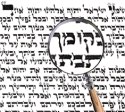
06.01.15 (Sivan 14, 5775) God is not the "author of confusion," and that means that rational intelligibility is foundational to divine revelation. "The Torah was written in the language of men," which is to say, it expresses ideas people can understand. The Scriptures declare: "Blessed is the man who ... delights in the Torah of the LORD (בְּתוֹרַת יְהוָה); all that he does shall prosper" (Psalm 1:1-3). And while it is true that we are no longer 'under' the terms of the covenant given at Sinai (Rom. 3:23), we still delight 'in' the Torah and meditate on its precepts day and night (Psalm 1:2; 19:8; 119:15, 47, 97; Neh. 8:12, etc.). After all, Torah "written upon the heart" is a mark of the New Covenant believer (Jer. 31:31-33). As it is written in Proverbs: "If you seek it [i.e., the wisdom revealed in the Torah] like silver and search for it as for hidden treasures, then you will understand the fear of the LORD and find the knowledge of God" (Prov. 2:4-5).
Furthermore, where it is written, "all Scripture is breathed out by God (θεόπνευστος) and is profitable for teaching, for reproof, for correction, and for training in righteousness, that the man of God may be complete, equipped for every good work" (2 Tim 3:16-17), it is evident that the Scriptures referred to here are the Jewish Scriptures (i.e., the Torah, the Prophets, and the Writings), since they are the foundation, the context, and the overarching matrix for the later New Covenant revelation... These were the Scriptures Yeshua used to contextualize and explain his ministry to his followers: "And beginning with Moses and all the Prophets, he interpreted to them in all the Scriptures the things concerning himself" (Luke 24:27; John 1:45). In other words, the Torah has both a logical, a linguistic, and a theological priority regarding our understanding of the New Testament Scriptures, and the failure to read in context invariably leads to faulty interpretations and doctrinal errors of various kinds. "To the Jew first, and [then] to the Greek" (Rom. 1:16) is a principle not only of how the gospel message would transcend ethnic Israel to be offered to all the nations, but also about how we should approach the subject of Biblical hermeneutics.... God "breathed out" (θεόπνευστος) his revelation in order, and the message itself must be understood in light of that order (John 4:22).
וְהָיָה כְּעֵץ שָׁתוּל עַל־פַּלְגֵי מָיִם
אֲשֶׁר פִּרְיוֹ יִתֵּן בְּעִתּוֹ וְעָלֵהוּ לא־יִבּוֹל
וְכל אֲשֶׁר־יַעֲשֶׂה יַצְלִיחַ
ve·ha·yah · ke·eitz · sha·tul · al-pal·gei · ma·yim
a·sher · pir·yo · yit·ten · be·i·to · ve·a·lei·hu · lo · yib·bol
ve·khol · a·sher · ya·a·sei · yatz·li·ach

"The one who delights in Torah is like a tree planted by streams of water
that yields its fruit in its season, and its leaf does not wither.
And all that he or she does shall prosper."
(Psalm 1:3)
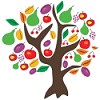
Since Yeshua the Messiah is Torah Ha'Emet - the True Torah - we should likewise celebrate the "Joy of Torah" in our lives. He is the Living Torah, the Living Word, written upon our hearts so that we can truly dance and embrace the Truth given from God. Indeed, Yeshua did not come to destroy the Torah but rather to fulfill it in our lives (Matt. 5:17-20).
For some more on this subject, see:
Faith in Unseen Good...
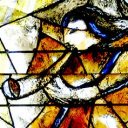
[ The following is related to this week's Torah reading, parashat Beha'alotekha... ]
06.01.15 (Sivan 14, 5775) From our Torah portion this week we read: "At the command of the LORD they camped, and at the command of the LORD they set out" (Num. 9:23). This teaches us that God's Name is to be heeded every step of the way. Whenever we journey someplace, near or far, we say, "be'ezrat Hashem ('with God's help') I am going to this place, and I will stay for so long, im yirtzeh Hashem ('if it pleases God')." As James the Righteous reminds us, "You do not know what tomorrow will bring. For what is your life? You are a mist that appears for a little time and then vanishes (James 4:14-15). "Man is like a breath; his days are like a passing shadow" (Psalm 144:4). We share exile with the LORD in this age, as strangers and sojourners with Him; indeed, our lives are hidden with Him, waiting to be revealed (Col. 3:1-4). "The present form (τὸ σχῆμα) of this world is passing away" (1 Cor. 7:31), and the heart of faith looks for a city whose designer and builder is God Himself (Heb. 11:10). "So we do not lose heart... For the things that are seen are turning to dust, but the things that are unseen endure forever" (2 Cor. 4:16-18).
The Scriptures declare that though the "outward self" (ὁ ἔξω ἡμῶν ἄνθρωπος) inevitably wastes away (διαφθείρω), the "inner self" (ὁ ἔσω ἡμῶν) is being renewed (ἀνακαινόω, i.e., "raised up in newness of life") day by day (2 Cor. 4:16), which implies that we have nothing to fear regarding our perpetuity and acceptance as God's beloved children. Therefore we do not "lose heart" (lit., act badly, from ἐκ, "out" + κακός, "badly"). Despite the shadows of this world, we take hold of the words of our Savior, who said: "I give you eternal life, and you will never be destroyed (ἀπόλλυμι), and no one will snatch you out of my hand" (John 10:28). And in another place he solemnly affirmed, "Everyone who lives and believes in me shall never die (οὐ μὴ ἀποθάνη)" (John 11:26).
אַל־תִּירָא כִּי גְאַלְתִּיךָ קָרָאתִי בְשִׁמְךָ לִי־אָתָּה
כִּי־תַעֲבר בַּמַּיִם אִתְּךָ־אָנִי וּבַנְּהָרוֹת לא יִשְׁטְפוּךָ
כּי־תֵלֵךְ בְּמוֹ־אֵשׁ לא תִכָּוֶה וְלֶהָבָה לא תִבְעַר־בָּךְ
al-ti·rah · ki · ge·al·ti·kha · ka·ra·ti · be·shim·kha · li · at·tah
ki · ta·a·vor · ba·ma·yim · it·kha · a·ni, u·va·ne·ha·rot · lo · yish·te·fu·kha
ki-te·lekh · be·mo · esh · lo · tik·ka·veh, ve·le·ha·vah · lo · tiv·ar-bakh

"Fear not, for I have redeemed you; I have called you by name, you are mine.
When you pass through the waters, I will be with you; and through the rivers,
they shall not overwhelm you; when you walk through fire you shall not be burned,
and the flame shall not consume you." (Isaiah 43:1-2)

|



